
about
faculty members
students
dates
publications
application
news
locations
contact

Together, these three studies form a cohesive body of work that significantly advances our understanding of the complement system in various clinical contexts. The novel antibody targeting C5aR1 offers a promising therapeutic tool, while the stem cell transplantation study challenges our understanding of immune dynamics during transplantation. Finally, the exploration of complement modulation in whole blood emphasizes the potential of complement-targeted therapies in infectious diseases.
The successful defense marks the culmination of years of rigorous research and sets the stage for further advancements in the field. As the research moves forward, it holds promise for better therapeutic strategies for autoimmune diseases, transplantation, and infectious diseases.
.jpeg)
We are happy to share that Julia successfully defended her PhD in Paris on December 18th, 2024. Her doctoral dissertation focussed on acquired abnormalities in complement-mediated glomerulonephritis, and highlighted three studies :
Study I: Functional characterization of anti-C3bBb autoantibodies and C3 Glomerulopathy phenotype. Julia has developed new biochemical assays to identify IgG autoantibodies targeting the C3BbB convertase, and found association of autoantibodies function with the complement alternative pathway overactivation and the disease severity of C3 Glomerulopathy.
Study II: Spectrum of anti-factor B associated glomerular diseases in adults. Julia highlighted that anti-Factor B was strongly associated with infection-associated glomerulonephritis. The functional characterization of these autoantibodies highlighted the proconvertase C3bB formation and the C3bBb stabilization as two important mechanisms of alternative pathway dysregulation.
Overall this work provides new pieces in our understanding of the pathophysiology of complement-mediated glomerulopathies but also paves the way for the use of new diagnostic assays for C3bBb convertase targeting autoantibodies and complement-targeted therapies to improve patient outcomes.

On a cold December day in Helsinki, the 13th December 2024, Mikel Rezola Artero defended his PhD successfully to gain a PhD from University of Helsinki and University Sorbonne in Paris. In his thesis, entitled “Mechanisms of complement subversion in Infection and cancer” he compared the evasion strategies pathogens and tumour cells employ to evade the complement system.
On the pathogen side, he explored how P. falciparum sporozoites resist complement attack through hijacking of the complement regulator C4b binding protein (C4bp).
On the tumour side, he investigated the mechanism behind the pro-tumoural role of intracellular factor H (FH) by a combination of transcriptomics in patient tumours, cellular and biochemical assays that demonstrated that intracellular FH acts as a multitasking tumour-promoting effector by regulating cell cycle progression and by maintaining cytoskeleton organization.
Thus both pathogens and tumour cells employ different, but on the other hand, similar mechanisms.
Ruben Pio Oses, Navarra, Spain, who was also a referee of the thesis earlier, acted as opponent. The other referee, and speaker of CORVOS, Reinhard Würzner, Innsbruck, Austria, was also in the evaluation committee on site. The two supervisors, Seppo Meri, Helsinki, Finland and Loubka Roumenina, Sorbonne, Paris, France were also present. The evening before, the candidate and the invited guests met at a typical Karelian restaurant and after the defence in the prestigious and picturesque Villa Aikala with a Lebanese buffet.
Congratulations to Mikel for his remarkable accomplishment!
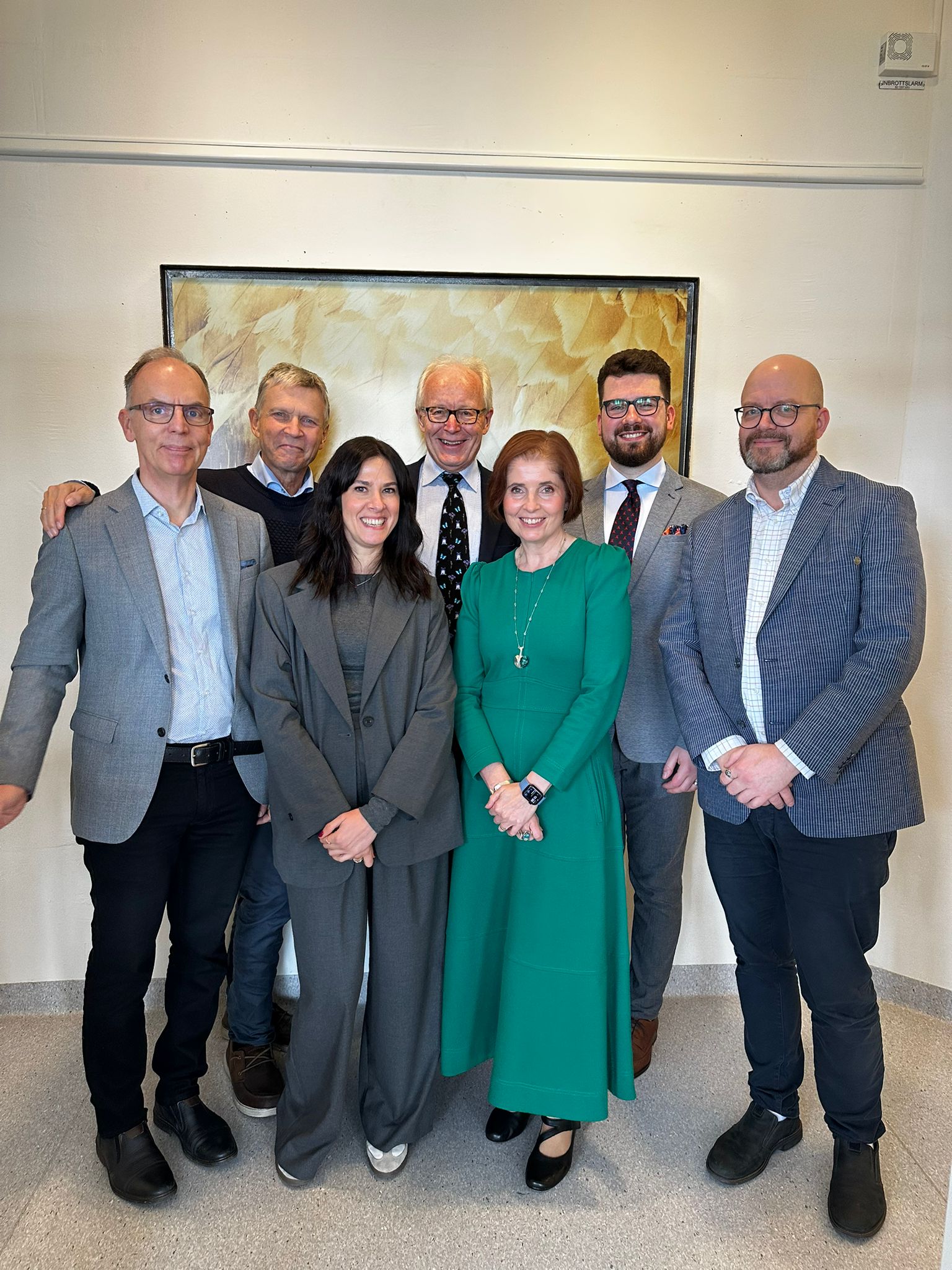
We are pleased to announce that Michal successfully defended his PhD thesis on October 25, 2024. His work focused on the complement evasion mechanisms developed by human pathogens, mainly Acinetobacter baumannii, Klebsiella pneumoniae, and Streptococcus pyogenes.
Papers I and II were dedicated to A. baumannii, a worrisome complement and antibiotic-resistant pathogen. In these papers, Michal screened many isolates from the genus Acinetobacter and aimed to characterize their MAC evasion strategy. He found two potential mechanisms worthy of further investigation.
In paper III, the focus switched to K. pneumoniae, another serious human pathogen. This study highlighted a surprising connection between complement and colistin resistance in isolates obtained from patients. This study delivered results worth considering in the epidemiology of Klebsiella infections.
Paper IV aimed to provide a treatment option that counteracts the complement evasion mechanism in S. pyogenes. This bacterium acquires the complement inhibitor factor H from serum to evade opsonization. Replacing the serum-bound inhibitor with the FH6-7/hFc fusion protein increased complement activation and resulted in better animal survival in the mouse model. This protein highlighted the possibility of using bacterial evasion mechanisms against the bacteria themselves.
Taken together, Michal's findings gave us a better overview of bacterial infections and their complement evasion mechanisms. As antibiotic resistance among human pathogens becomes more serious, novel treatment options are needed.
We wish Michal all the best for his future career and research projects.
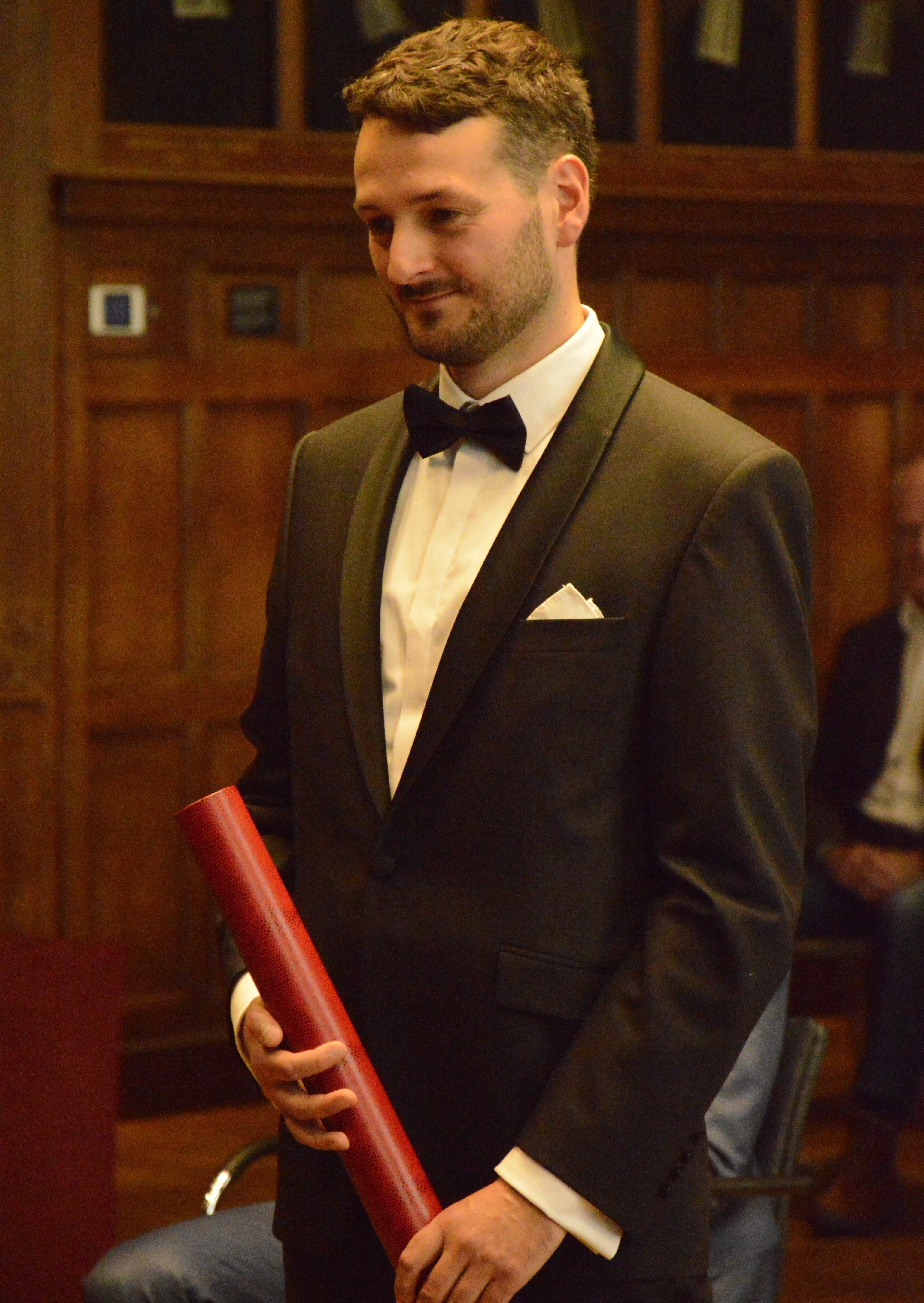
On October 3rd, Frerich successfully defended his doctoral dissertation in Utrecht. His thesis provided valuable insights into how Gram-negative bacteria escape killing via the complement system.
Frerich’s research comprised of four studies:
The findings highlight the complexity of bacterial immune evasion and the potential for targeting these resistance pathways in the development of new antimicrobial strategies.
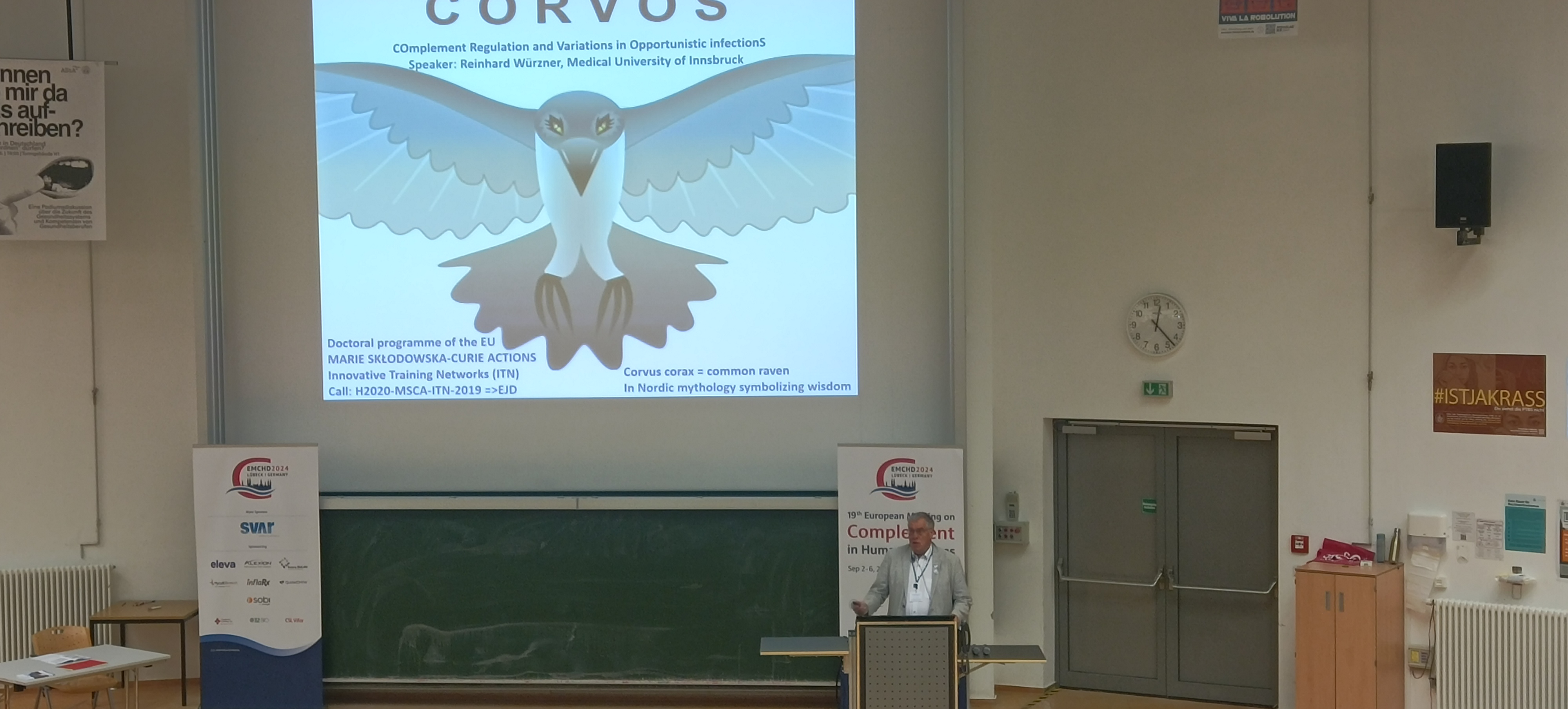
The European Meeting on Complement in Human Disease, Lübeck, 2024, organized by Jörg Köhl and his team was the official international farewell event for CORVOS with a concluding meeting.
The final report had been accepted well before and the speaker, Reinhard Würzner, was proud to announce that all projects were successfully accomplished (due to the Corona crisis some had to be changed, though, but most actually to the better and a lot of CoCo papers (for Complement & Corona) were published by the CORVOS consortium). After the meeting the consortium met at the Schiffergesellschaft where the Speaker delivered some final words and the CORVOS aprons in the courtyard. The dinner was afterwards in the very picturesque halls.
Time to say goodbye to some members of the consortium, but others were looking forward to another Obergurgl retreat in early January 2025. Thus, CORVOS is still flying....

We are delighted to congratulate Max on successfully completing his PhD! His thesis provided valuable insights into the role of the complement system in the innate immune response, focusing on the pathogens SARS-CoV-2 and Aspergillus fumigatus.
Max's research comprised three significant studies:
(1) Max developed a sensitive MASP-2 ELISA to investigate its association with COVID-19. He found that MASP-2 concentrations were significantly increased in COVID-19 patients compared to healthy controls and correlated with age, female sex, and higher mortality. Additionally, MASP-2 levels were linked with terminal complement complex (TCC), ficolin-2, ficolin-3, and C-reactive protein (CRP), suggesting MASP-2 as a potential biomarker for COVID-19.
(2) By exploring the binding kinetics of pattern recognition molecules (PRMs) of the complement system on pathogen surfaces, Max discovered that C1q and MBL rapidly bound and then detached from pathogen surfaces within minutes in plasma, a process associated with complement cascade activation. C1q detachment was linked to the activation of the C1 complex, while MBL dissociation relied on overall complement activation and solubilization via C3b.
(3) Max investigated the innate immune responses to A. fumigatus in whole blood, finding that it triggered complement and leukocyte activation, similar to E. coli. Although A. fumigatus induced a less extensive cytokine response compared to E. coli, complement inhibition significantly altered the release of six key cytokines, indicating the complement system's role in cytokine release. The expression of most cytokines depended on the monocyte fraction in whole blood.
Collectively, these studies demonstrate the significant role of the complement system in infections with SARS-CoV-2 and A. fumigatus. Max's work highlights the potential connections between cytokine release, pathogen opsonization, and the detachment of C1q and MBL from microorganisms, though further research is needed to fully understand these mechanisms.
We wish Max the best of luck for his future academic career.
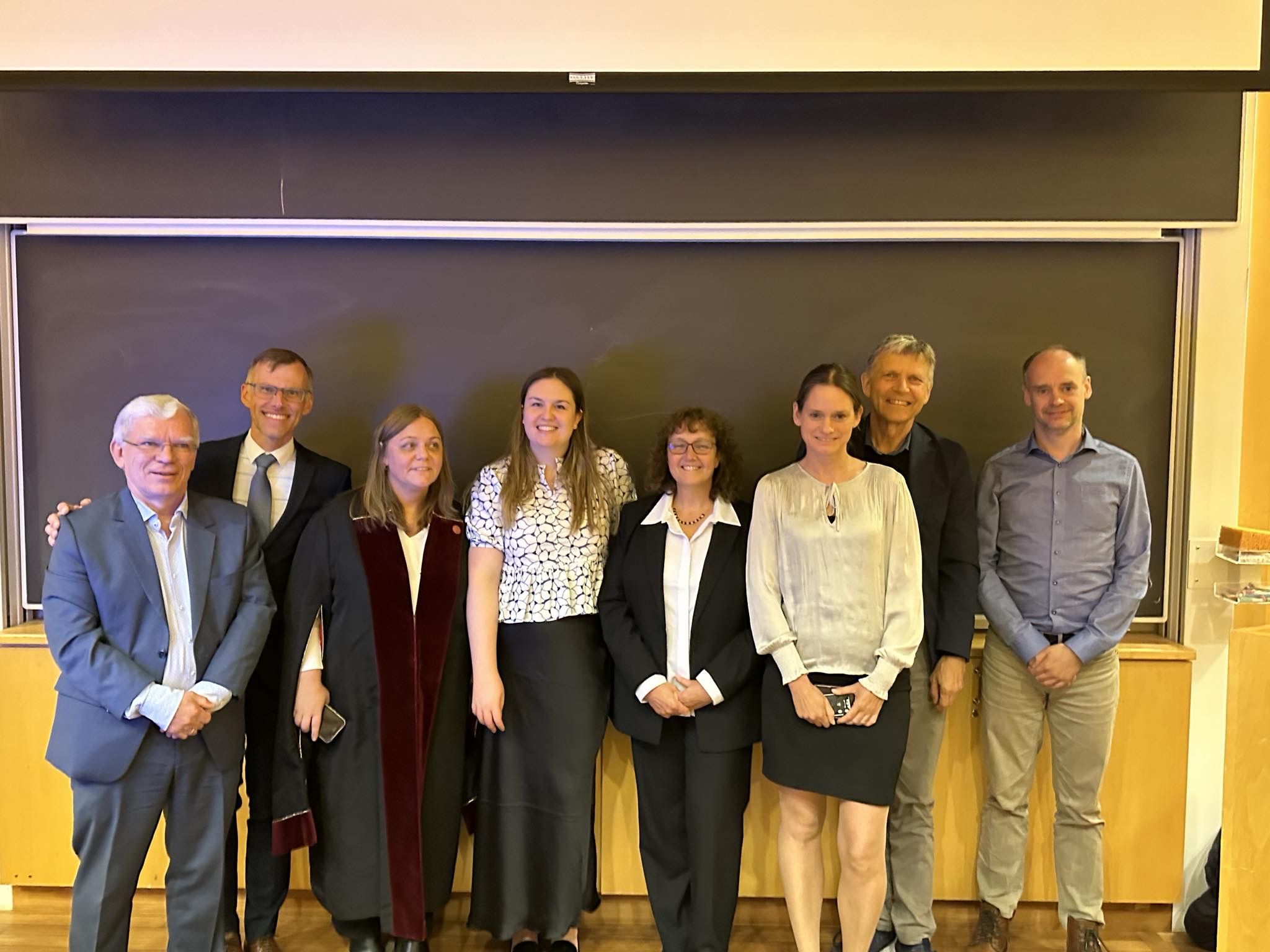
We are thrilled to announce that Beatrice has successfully graduated with her PhD! Her thesis explored the human innate immune system using the lepirudin whole blood model. This model, introduced in 2002, uses the anticoagulant lepirudin to maintain complement system function while preventing blood coagulation. Beatrice's work involved collecting blood in lepirudin-treated tubes, exposing it to various activators, and analyzing cell activation markers, complement activation, and inflammatory mediators.
Beatrice's thesis consisted of three significant papers:
Paper I: Beatrice developed a novel model by selectively removing individual cell populations, revealing the specific roles of monocytes and granulocytes in cytokine release. This study was published in the Journal of Leukocyte Biology.
Paper II: She investigated the inflammatory response to Aspergillus fumigatus conidia compared to Escherichia coli, identifying CD14+ monocytes as key contributors to cytokine release. This paper was published in the Journal of Innate Immunity.
Paper III: Beatrice adapted the model to study patients with acute myelogenic leukemia (AML) undergoing hematopoietic stem cell transplant (HSCT). The study showed that AML patients maintain a functional complement system throughout the transplantation period. This paper is under revision for publication in Frontiers in Immunology.
Collectively, these papers enhance our understanding of innate immune responses and pave the way for new targeted therapeutic strategies.
We are incredibly proud of Beatrice's achievements and wish her all the best in her scientific career.
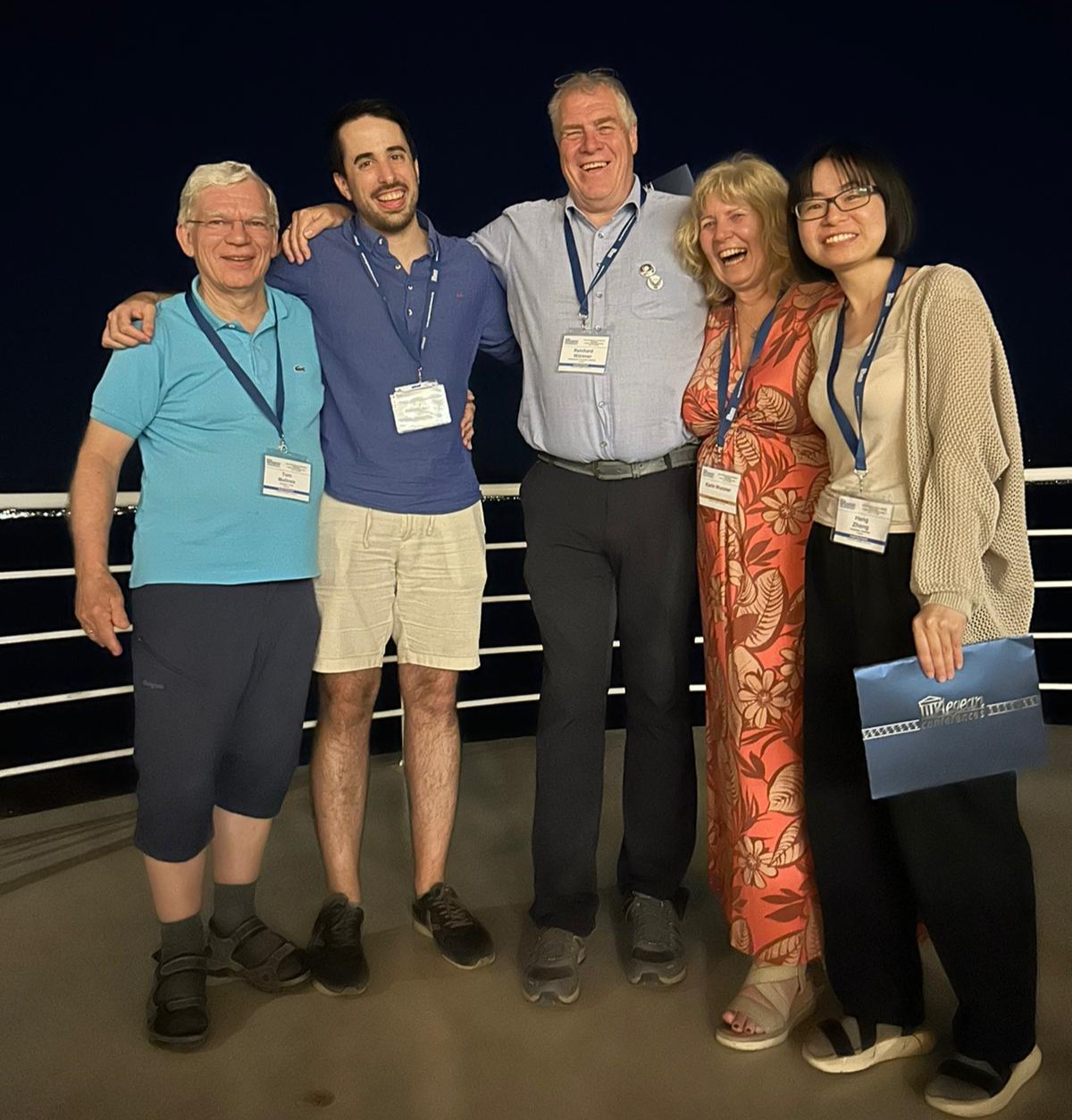
On the 11th June 2024 two CORVOS ESRs Hang Zhong (IT-1) and Mikel Rezola Artero (FI-2) participated in the 16th International Conference on Complement Therapeutics. They showcased their research through oral presentations and flash poster talk sessions which stimulated scientific discussion and provided invaluable feedback on both projects.
This meeting in Loutraki, Greece, provided an opportunity to bring together complement experts from both academia and industry. Participants shared new data and discussed the latest developments in therapeutic design, clinical trials, and new aspects of complement-driven pathophysiology.
Following an intense, one week program on a wide variety of topics ranging from complement-driven haematological/ocular/kidney/neurological disorders to complement in infectious diseases, the conference finished with a farewell dinner where all the participants enjoyed live music and had the opportunity to learn some local dances. Finally, the evening culminated in the announcement of the awards, where both of the ESRs received trainee awards due to their commendable contributions to the conference.
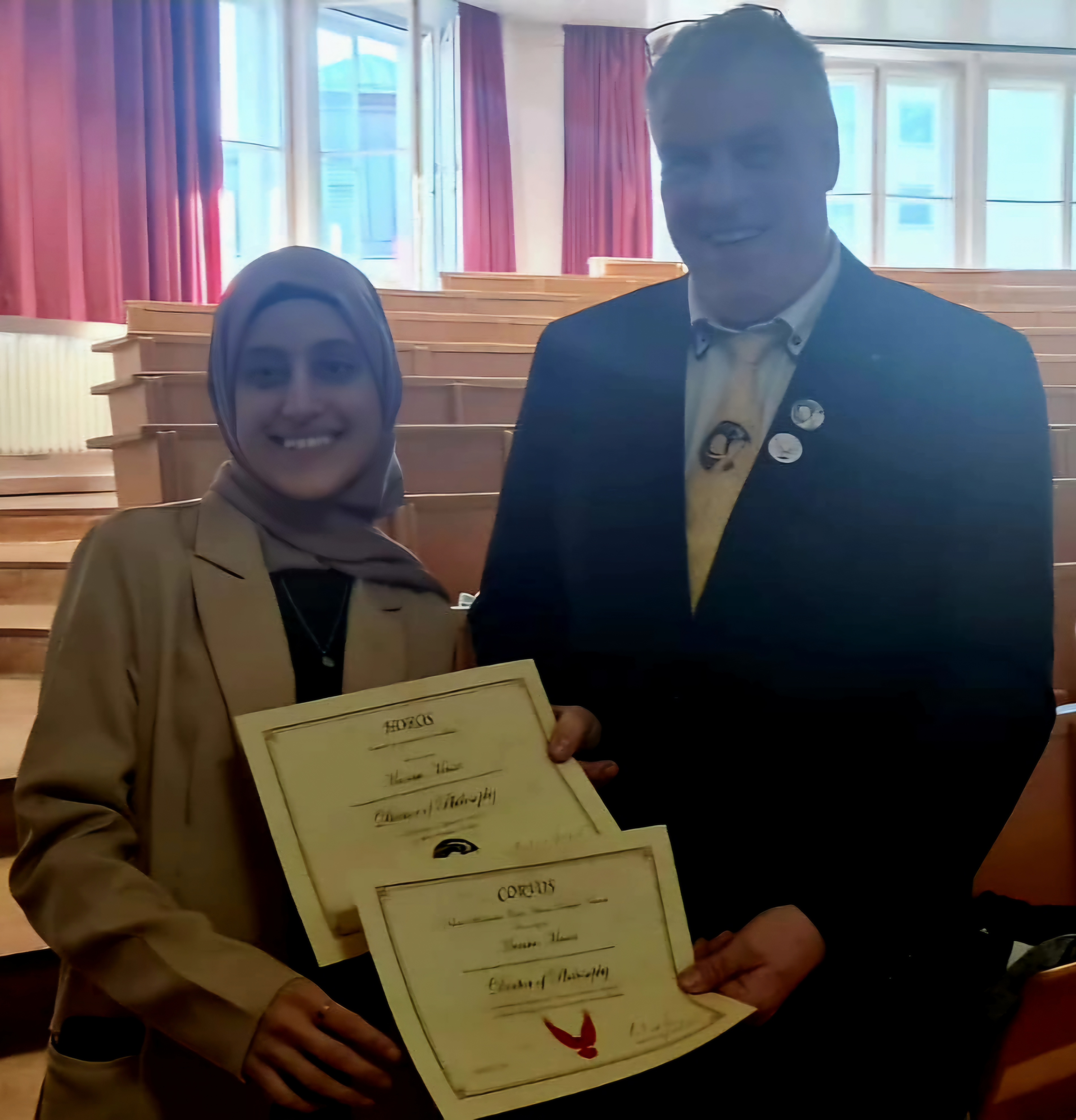
We are delighted to announce that Mariam has successfully completed her PhD! Her research focused on the complement system, specifically the component C7, which is crucial for the assembly of the membrane attack complex (MAC). While the structure and function of C7 in MAC assembly are well documented, Mariam's work aimed to uncover the non-canonical roles of C7, which are less understood. Mariam's thesis explored several key areas: (1) Extrahepatic Synthesis of C7: Unlike most complement proteins, C7 is primarily synthesized outside the liver, allowing it to regulate local MAC assembly. This unique synthesis pathway suggests that C7 could play distinct roles in different tissues. (2) Association with Disease Pathogenesis: Emerging studies have linked C7 with various diseases, highlighting the need for further investigation into its non-canonical functions. (3) Development of Monoclonal Antibodies (mAbs) and Immunoassays: A major aim of Mariam's research was to create reliable tools for characterizing C7. She developed monoclonal antibodies that specifically bind to native C7, which were then used to establish an enzyme-linked immunosorbent assay (ELISA) for measuring C7 in different matrices. This novel ELISA demonstrated high specificity and no cross-reactivity with similar proteins. (4) Interaction with Clusterin (CLU): Mariam's investigation into the regulatory role of C7 revealed a significant association with the complement inhibitor clusterin (CLU). Her work indicated the presence of a C7-CLU complex in circulation, suggesting that C7 has multifunctional roles beyond its traditional functions in MAC assembly.
Mariam's innovative research has provided new insights into the complex roles of C7 and developed valuable tools for future studies. We are incredibly proud of her accomplishments and wish her all the best in her scientific career.
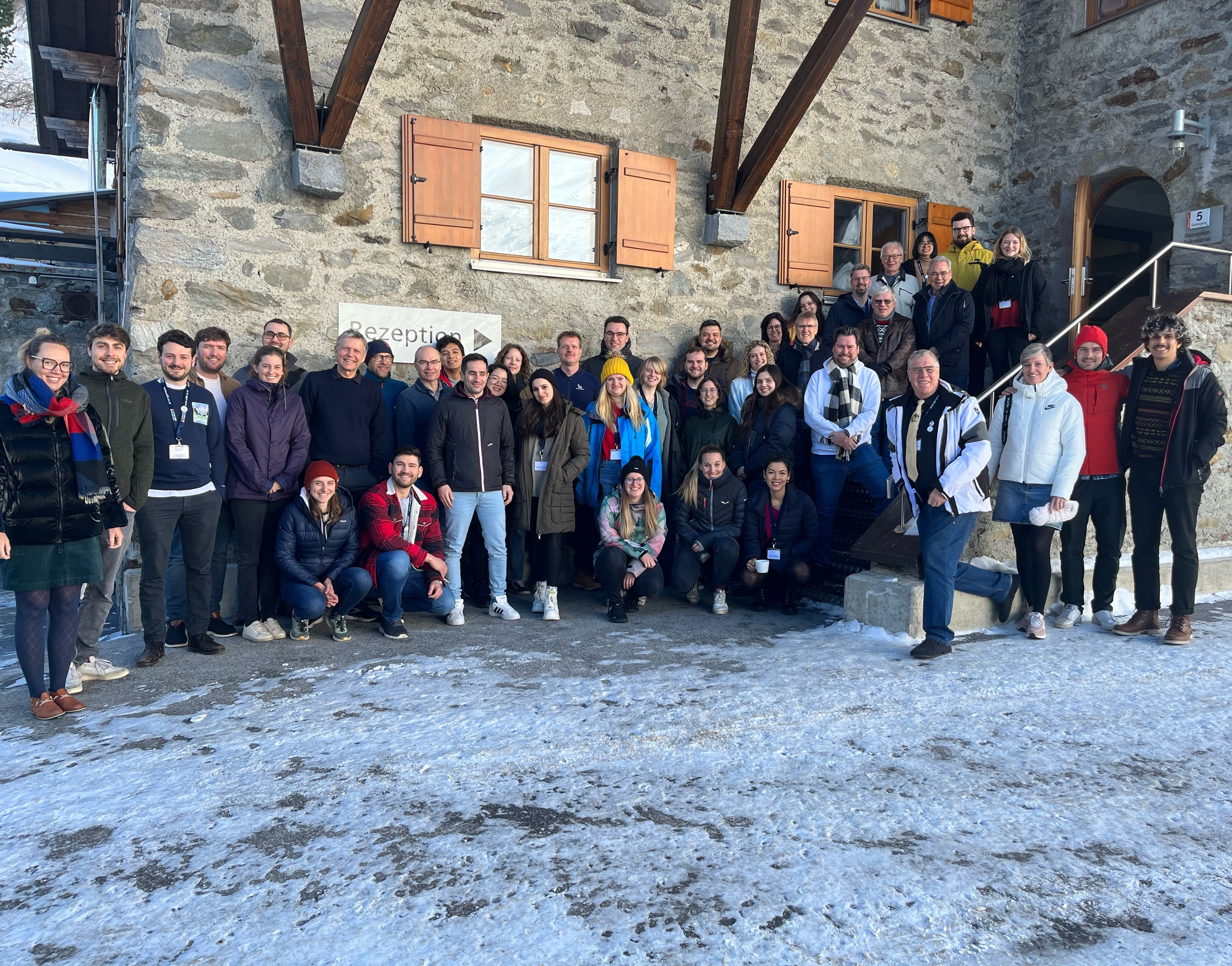
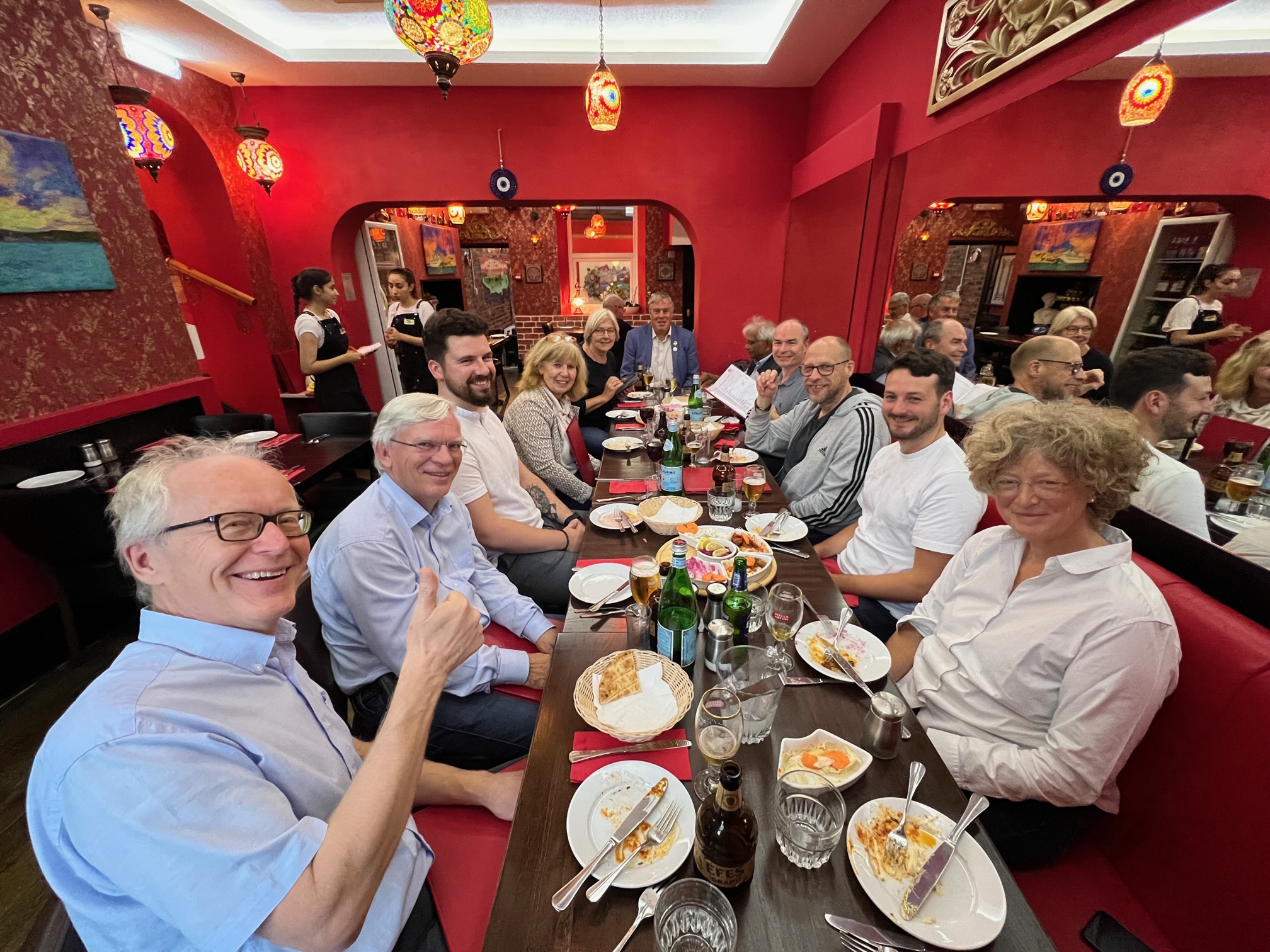
The International Complement Workshop in Newcastle, organized by Kevin Marchbank and Claire Harris and their team was the first complement meeting in person of the International Complement Society to be organised after the Corona crisis. In Berlin 2021, it was quite funny to chase people virtually in poster viewing rooms and it was great to hear good science and to keep contact, but it is simply not the same thing to meet in person. Thus, a lot of CORVOS housekeeping issues were discussed in person, including an official CORVOS Supervisory Board Meeting, organised by the CORVOS & HOROS administrator Silke Huber.
Now, after so many students being quite advanced, the networking in the evening in the bars was a highlight. The CORVOS students met for a dinner with their supervisors.
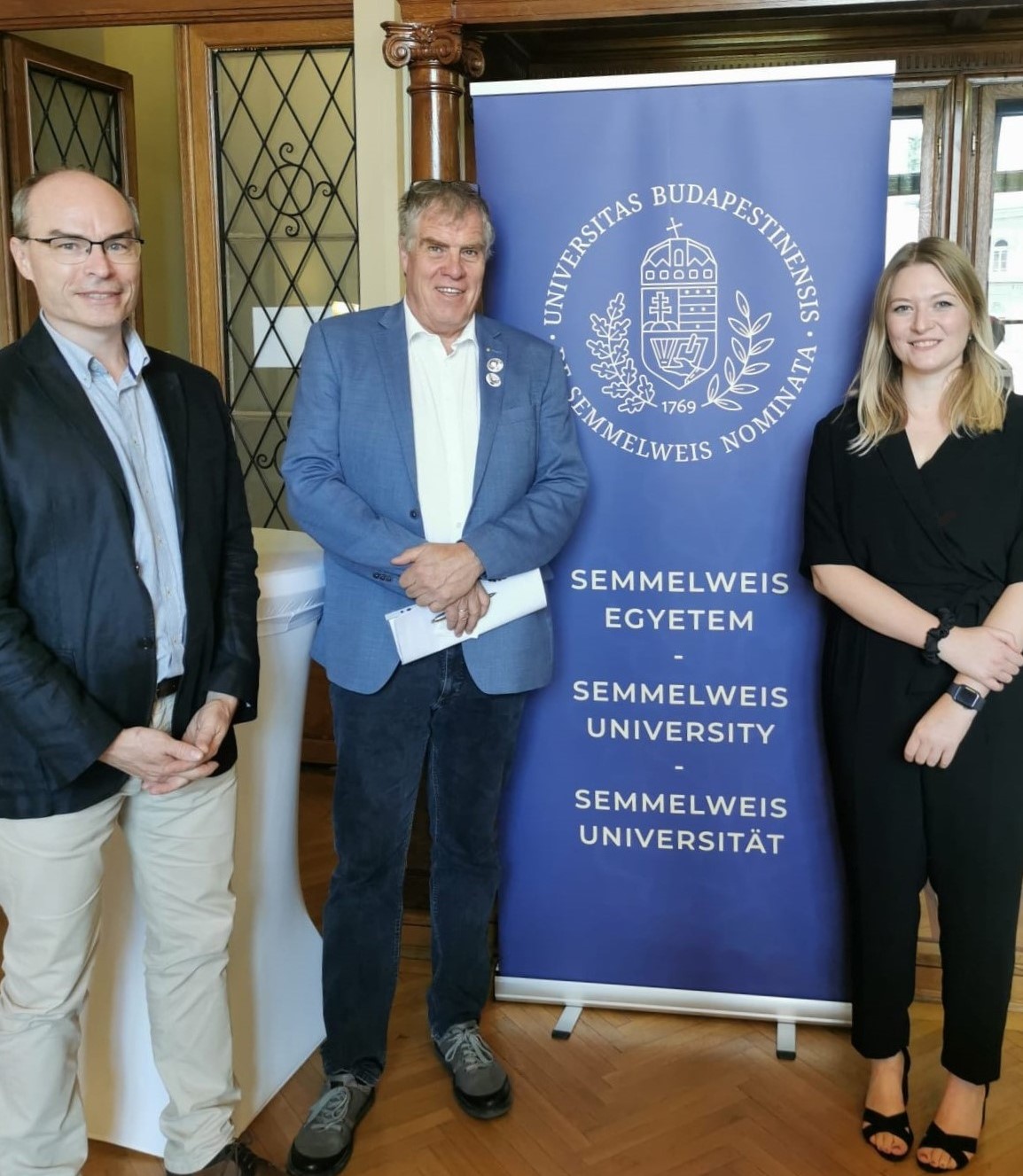
On June 19th, 2023 Lisa was the first of our excellent CORVOS students to defend her thesis. In the past three years, she developed immunoassays for the measurement of C1s/C1-INH complex and MASP-1/C1-INH complex in human serum and plasma. Finally, these assays were characterized and validated in cohorts of COVID-19 and sepsis patients. Both complexes were proven to be specific biomarkers for early classical and early lectin pathway activation. Lisa was supervised by Prof. Zoltán Prohászka, MD, PhD from the Doctoral School of Theoretical and Translational Medicine Semmelweis University, Budapest, Hungary and Prof. Reinhard Würzner, MD, PhD from the Institute of Hygiene and Medical Microbiology, Medical University of Innsbruck, Innsbruck, Austria. In addition to her main studies in Budapest, Lisa spend 6 months at the Medical University of Innsbruck (Austria), did 1 month clinical training at the University Hospital in Helsinki (Finland), did 1 month of industrial entrepreneurship and 6 months industrial secondment at Hycult Biotech (The Netherlands). Congratulations, welcome to the Alumni club and all the best for your future.
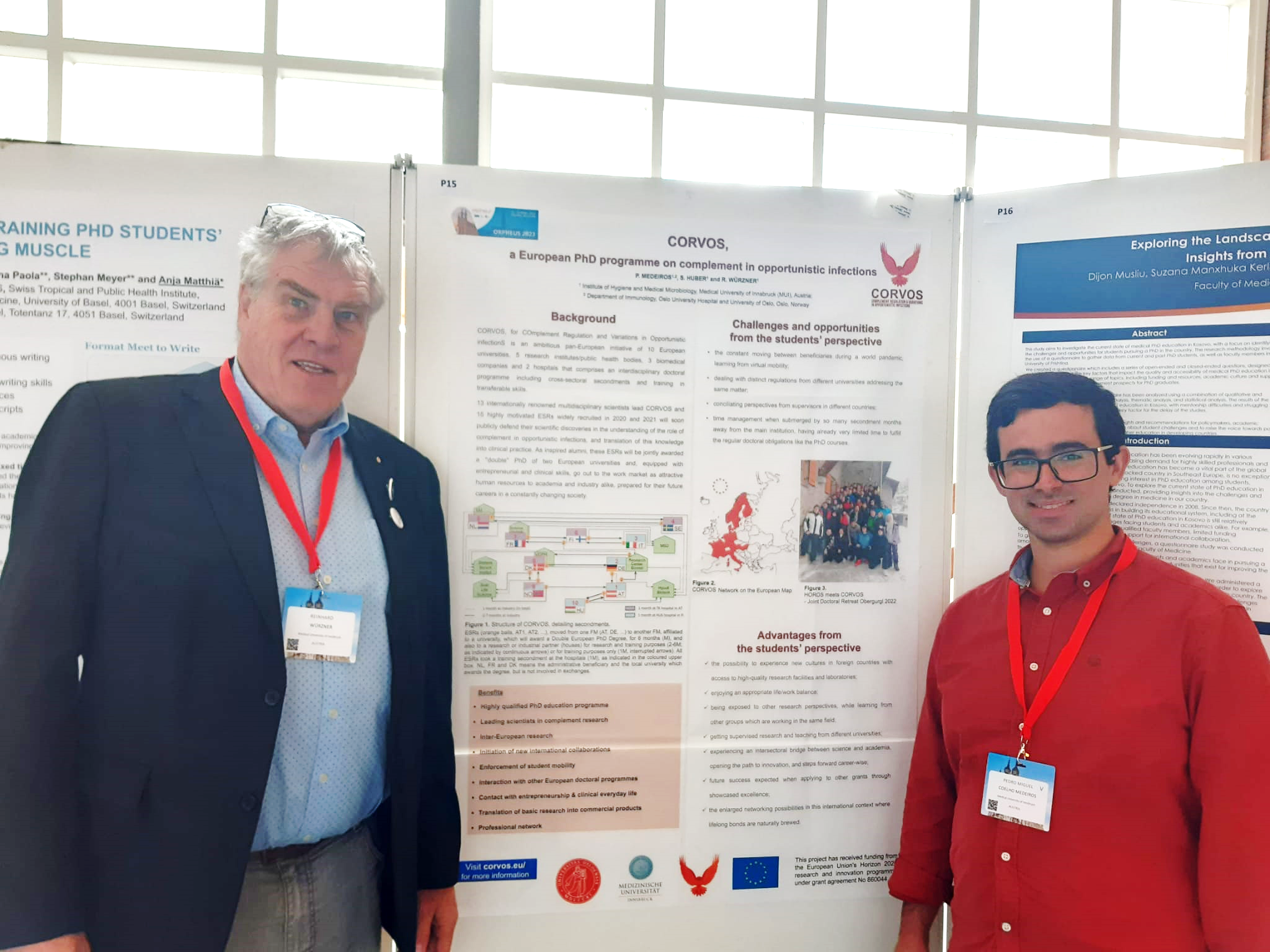
Doctoral training prepares doctoral candidates for their future careers in a constantly changing society. In this context, MUI is a member of the Organisation for PhD Education in Biomedicine and Health Sciences in the European System, or ORPHEUS, which aims to safeguard the PhD as a research degree by supporting graduate schools, faculties and departments, research students and their supervisors, through quality assurance mechanisms, advocation of best practices, professional development and training.
At this year’s ORPHEUS conference, which took place from the 13th to the 15th of April in Leuven (Belgium), alongside international keynote speakers and presenters selected from submitted abstracts, CORVOS Speaker Prof. Dr. Reinhard Würzner and CORVOS ESR Dr. Pedro Medeiros showcased how CORVOS has been successfully implemented in several European countries. At the annual meeting, opportunities and challenges associated with these contemporary elements of doctoral training and research activities were also discussed. There were namely workshops, panel discussions, presentations and poster sessions, meeting new colleagues and several networking possibilities.
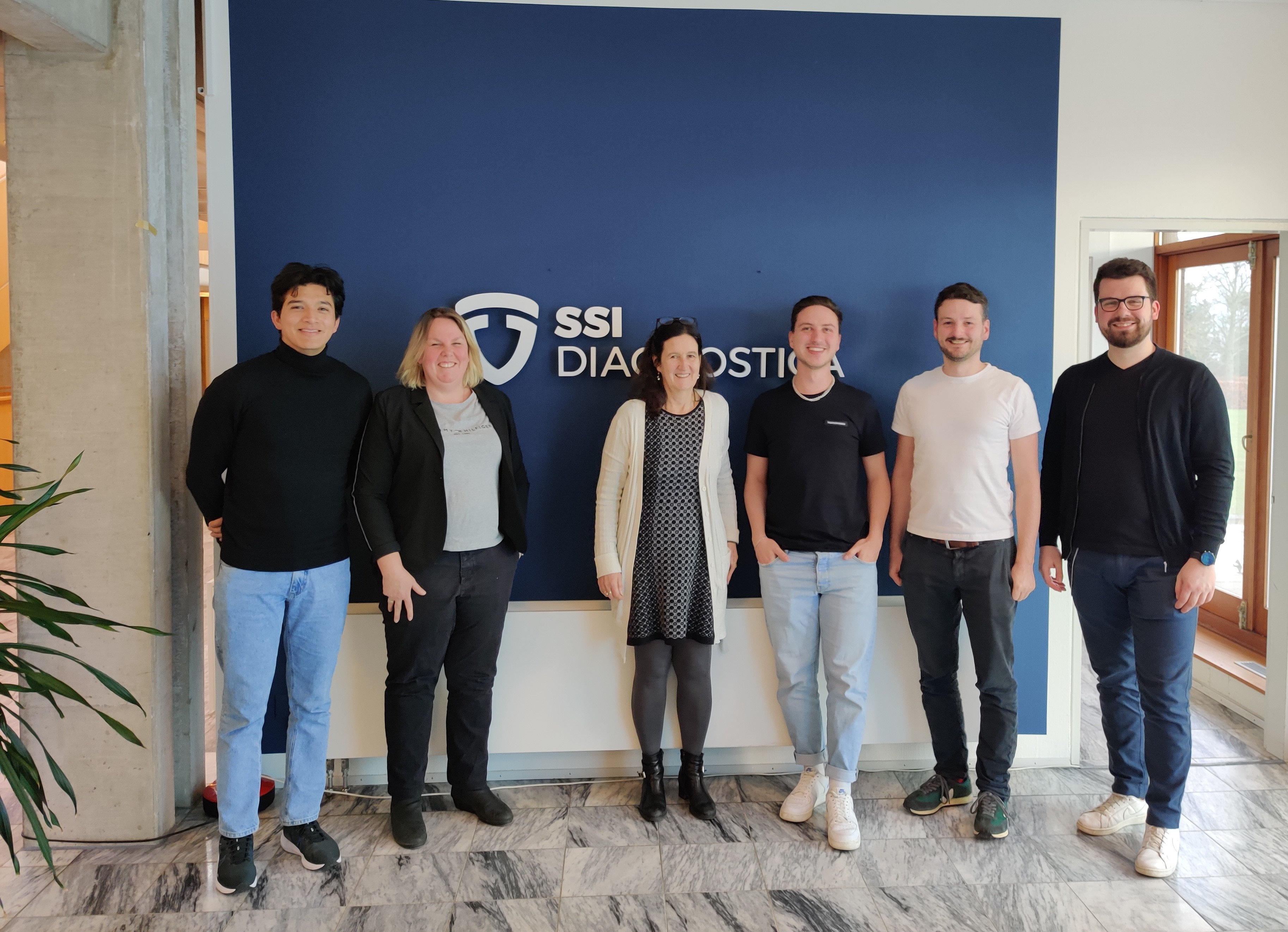
On February the 27th 2023, four CORVOS ESRs began their industrial entrepreneurship secondment at SSI DIAGNOSTICA and AJvaccines. The ESRs (Alejandro, Frerich, Maximilian, and Michal), started at SSI Diagnostica in companionship with Professor Karen Angeliki Krogfelt. On the first day, they were introduced to a wide variety of basic knowledge of Legionella & Pneumococcus bacteria, their epidemiology and serotyping, associated diseases, and diagnostics led by Pernille L. Elverdal. Later that day, the Ph.D. candidates were introduced to the development of lateral flow tests by Ian C. Skovsted, one of the main business branches of SSI Diagnostica.
The next day, the ESRs applied the theory and developed and assembled their very own lateral flow assays. In the afternoon, they learned about Pneumococcal antigens and how SSI Diagnostica conducts research and diagnostics on Pneumococcus. Later that day, the students were introduced to the different bacterial identification methods and the new products that the company is developing for testing resistant bacteria, phenotyping, and serotyping them.
After an exciting day producing a range of their new products and learning about some specific pathogenic bacteria, the ESRs went to dinner with many of the SSI DIAGNOSTICA employees as well as the host, Professor Krogfelt. The students shared some common outlooks and perspectives regarding what to do after obtaining the Ph.D., and they got a lot of helpful feedback, as well as some input from people that have been in the industry for a long time. Another successful network opportunity within the scope of CORVOS.
On the last day at the company, the Ph.D. students visited the laboratories again and were introduced to the different working areas regarding Salmonella and E. coli, their epidemiology and serotyping, as well as the production line for some specific products for diagnosis of bacterial identification. Later that day, the students met the head of R&D, Karen Korsholm, to talk about new developments on their Luminex. Finally, the ESRs were introduced to the new legislation regarding IVDR, how much this impacts the product pipelines and what is needed to make a CE-certified kit. After those information-packed and engaging days at the company, the students decided to join Prof. Krogfelt at the Louisiana museum of modern arts for a get-together and some informal conversation about future perspectives in industry or academia.
The next day, the students visited another company, AJvaccines, where they met Sylvester Larsen and received an introduction to the production of the polio vaccine. AJvaccines being one of the last manufacturers of this crucial vaccine. They also got to know about the production of the BCG vaccine, the BCG culture for cancer treatment and the production of their tetanus vaccine. After this session, the students took a guided tour of the polio vaccine production facility. With this, the students said their goodbyes to the fantastic host Professor Krogfelt who made it possible to experience this opportunity and gain all of these new insights into the industrial processes.
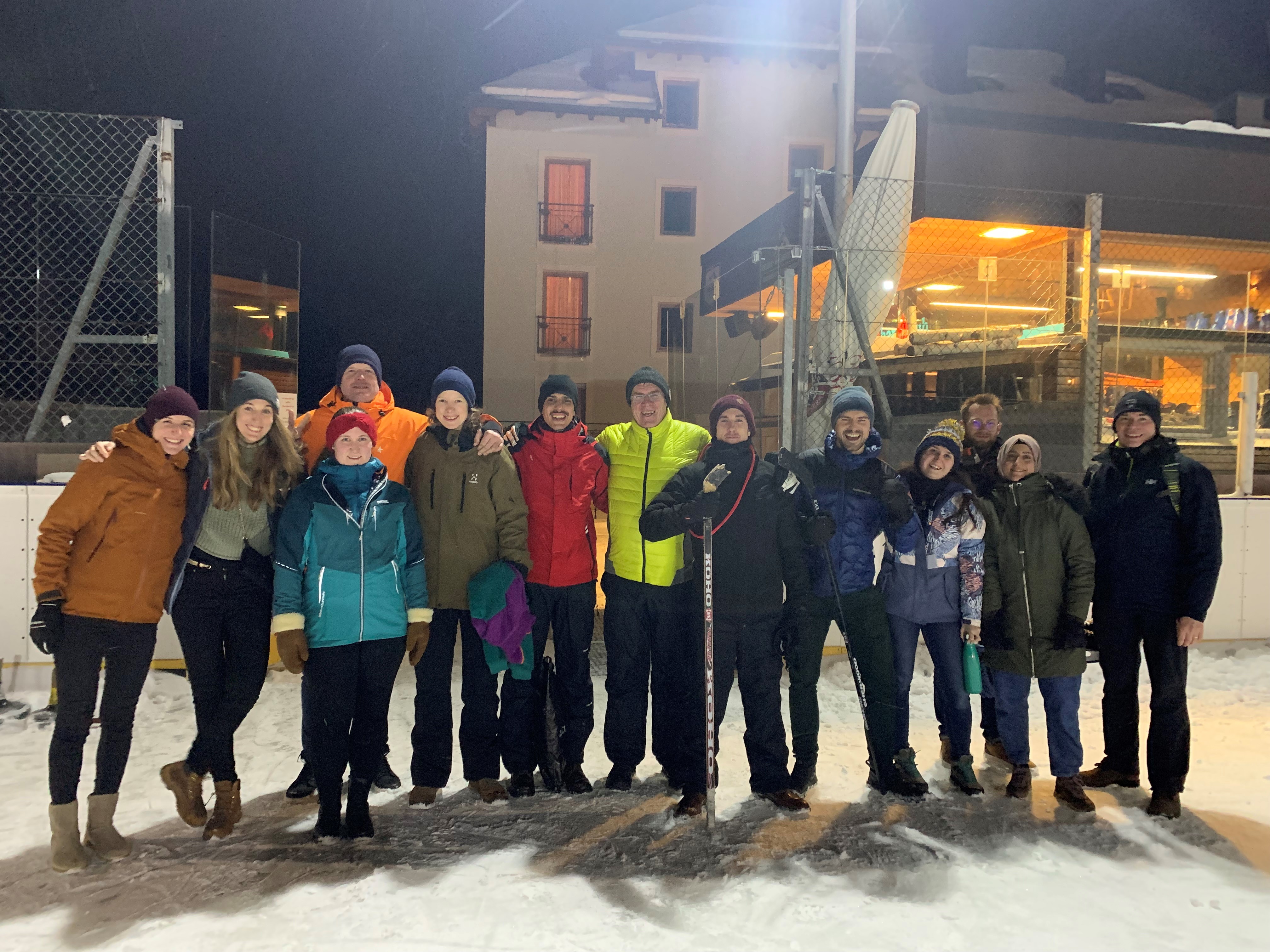
As last year, our retreat to the beautiful Obergurgl could be held from 07th to 9th of January 2023 - this time without restrictions. Once again members of two PhD programmes of excellence, HOROS (Host response in opportunistic infections) and CORVOS (Complement regulation and variations in opportunistic infections) as well as local PhD candidates from the IIT (Infection, Immunology, and Transplantation, Innsbruck, Austria) program came together to enjoy scientific discussions and do networking to push their research projects forward. Renowned scientists from across Europe, including Jörg Köhl (Lübeck, Germany), Seppo Meri (Helsinki, Finland), Tom Eirik Mollnes (Oslo, Norway), Peter Garred (Copenhagen, Denmark), Zoltán Prohászka (Budapest, Hungary) Mohamend R. Daha (Leiden, Netherlands) representing CORVOS as well as Christian Karsten (Lübeck, Germany) and Mikkel-Ole Skjødt, both member of the HOROS advisory board, participated and inspired with their talks. Especially for our PhD candidates it was a perfect environment to prove their scientific and presentational skills in front of experts in the field of opportunistic infections and immunology in a relaxed and private atmosphere. Additionally, representatives of the CORVOS industrial partner Hycult Biotechnology (Uden, Netherlands), namely Loek Willems, Eirik Toonen, and the CEO & Owner Ronald de Niet as well as of the company Novartis (Schaftenau, Austria), Marco Grasse (former CORVOS Administrator) were present.
Besides a tight schedule, there was still time for networking and team building with PhD students and principal investigators. The majority of participants enjoyed skiing at the lovely nearby slopes or assisted one another in learning how to ski while some went hiking or sledding. Another highlight was ice-skating were we played the popular Hungarian “catch on ice” game. No matter the favorite sport, they were all ideal for interacting with other scientists.
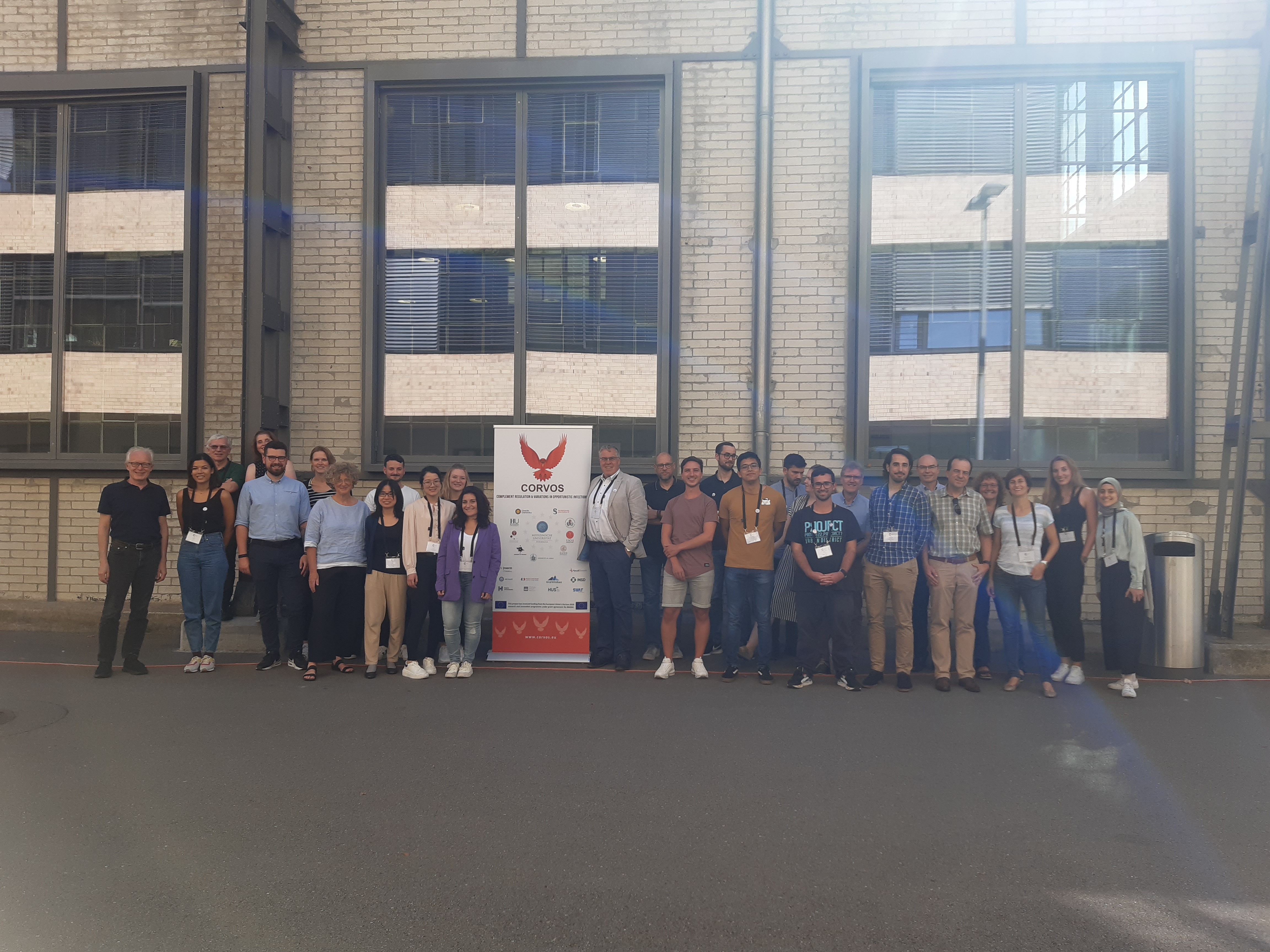
The European Meeting on Complement in Human Disease, Bern, 2022, organized by Robert Rieben and his team was the first complement meeting in person after the Corona crisis and a lot of CORVOS housekeeping issues were discussed in person, including an official CORVOS Supervisory Board Meeting, organised by the CORVOS & HOROS administrator Silke Huber. A new CORVOS flyer was presented.
In addition, another teaching lecture was held on how to create a good poster and a CORVOS group photo was shot afterwards.
Virtually all CORVOS students were present as well as their supervisors. Excellent presentations were given at the conference, namely two oral presentations and 14 talks (see list). The networking highlight was the boat trip on Lake Lugano.
HOROS students working on complement (Verena Harpf und Sara Kellnerova) discussed future collaborations with their CORVOS peers.
CORVOS & HOROS speaker finds „his“ shop“
CORVOS flyer
CORVOS teaching lecture on how to create a good poster
CORVOS group picture
List of CORVOS contributions
Conference Dinner 1
Conference Dinner 2
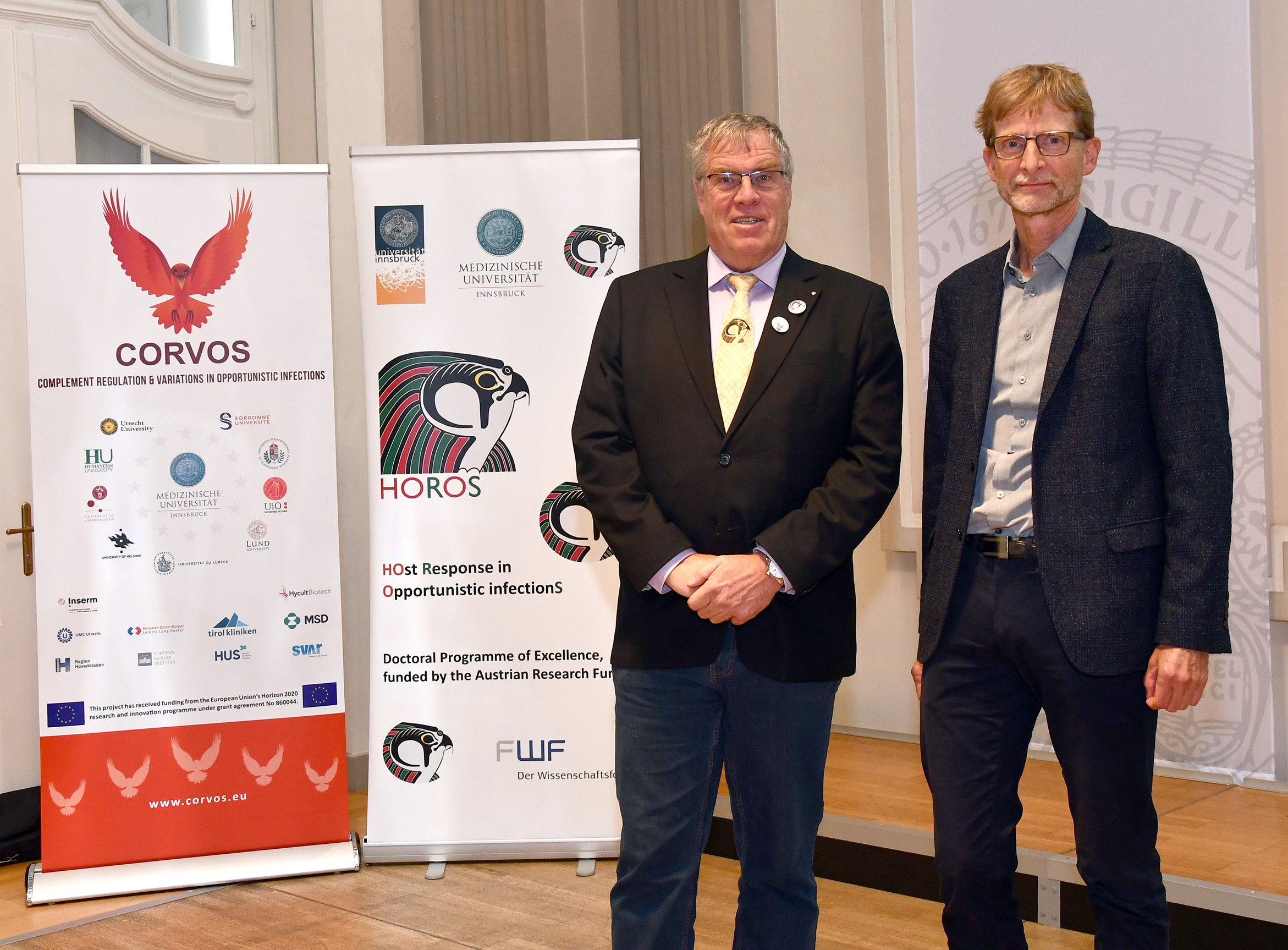
Innsbruck has a long history of training PhD candidates in biomedicine. Initiatives to build an "international state of the art" in PhD education were started even two years before the Medical University of Innsbruck was founded in 2004. Last week, 20 years of effective PhD education in Innsbruck were celebrated!
Vice-Rector Bandtlow emphasized Georg Wick's exceptional achievement in convincing the relevant ministry to fund doctoral programs at Austrian institutions between 2003 and 2005 while serving as the President of the Austrian Science Fund (FWF). After all, the Medical Institution of Innsbruck was the first Austrian medical university to provide an FWF-funded Doctoral College, and the program's success ultimately helped universities to further establish organized doctorates.
The doctoral programs at the Medical University of Innsbruck that have been and are still being funded by the FWF and the EU are known by the acronyms MCBO, SPIN, HOROS, CORVOS, as well as CavX, IGDT+, and CBD. Some of these programs have been run in collaboration with the University of Innsbruck, hastening the internationalization of doctoral training.
Besides Bernhard Flucher whose PhD college MCBO was seen as a “role model” for other Austrian medical graduate colleges, Reinhard Würzner’s dedication to doctoral education by being the speaker of HOROS and the first EU doctoral college in the life sciences sector coordinated by an Austrian university, CORVOS, was particularly highlighted.
Foto: D. Bullock, MUI
On the 16th of September 2022 researchers from the Medical University of Innsbruck met at the 8th CIIT Science Day with CORVOS & HOROS, which had been organized with great commitment by Thomas Sonnweber, Doris Wilfingseder and Wilfried Posch. In the seminar rooms of the MZA, allocated researchers and PhD students presented almost 50 current research projects in demanding poster sessions. Additionally, Univ.-Prof. Dr. Andreas Bergthaler from the Institute of Hygiene and Applied Immunology (Medical University of Vienna) was invited to the event and delivered an exceptional keynote lecture. The lively scientific exchange followed by a light buffet with drinks made this year’s Science Day a resounding success. We want to thank all people involved in the organization and the participants for this interesting and stimulating meeting.
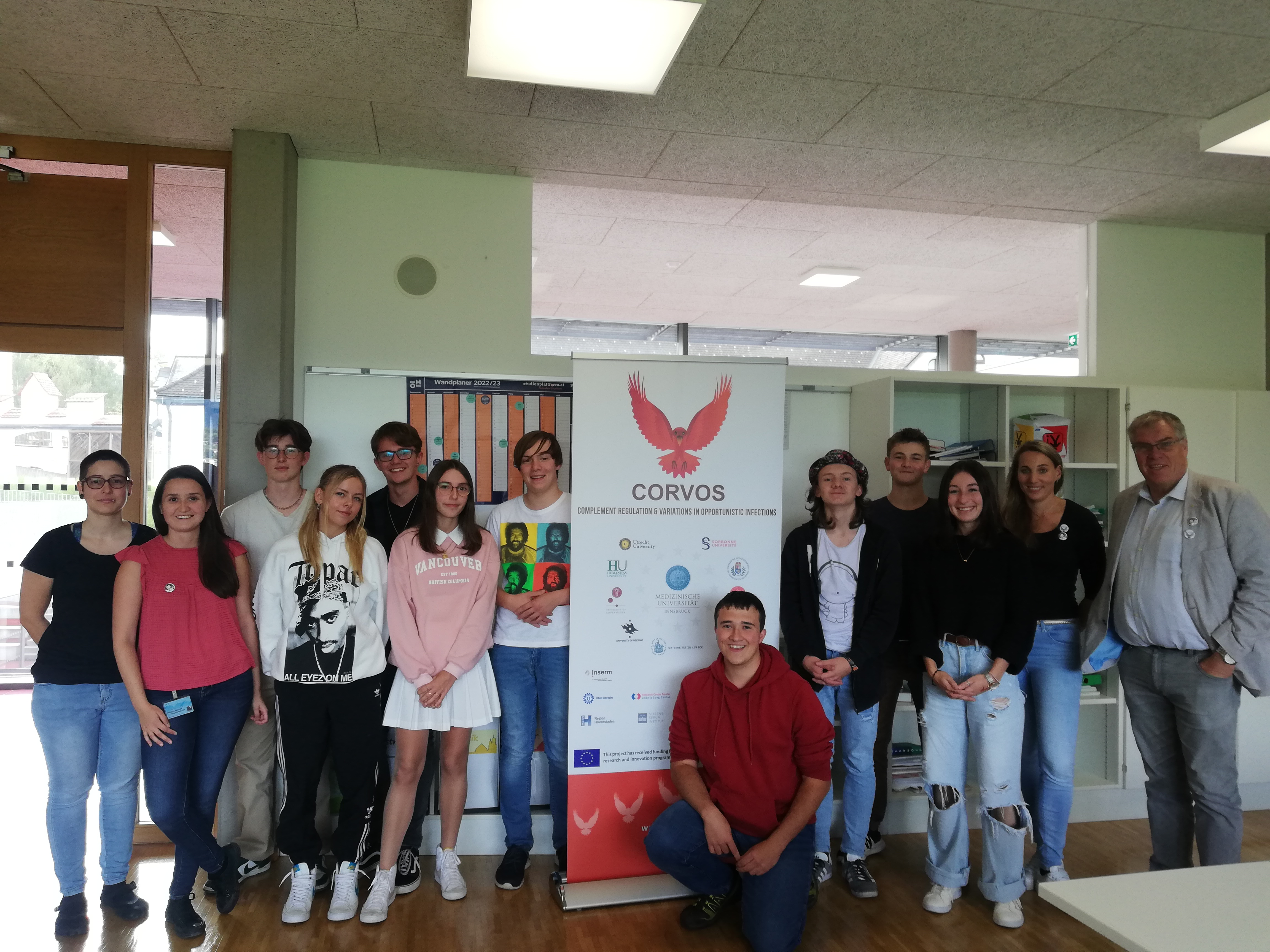
On September 19th, 2022, members of the CORVOS and HOROS programmes visited the Meinhardinum in Stams, a high school located in the heart of Tyrol, Austria, to bring pupils closer to research and scientific work. After an introduction about the CORVOS and HOROS programmes by Prof. Würzner, the speaker of CORVOS and HOROS, in front of three final-year classes, PhD students individually presented their cultural background and their motivation to achieve a PhD. This was done in smaller groups, i.e. in three class rooms. Since all PhD students were female, pupils got the view that everybody, independent of gender, can find a place in science. In addition, the role of females in science was particularly discussed. Furthermore, students talked about their experiences and acquisition of subject-specific and soft skills during their studies. Finally, pupils had the chance to ask any questions regarding their potential scientific future. We hope that our enthusiasm for research inspired some of the pupils to strive for a career in science and to aim for a doctoral degree. Overall, it was a very nice experience for both sides, pupils and PhD students.
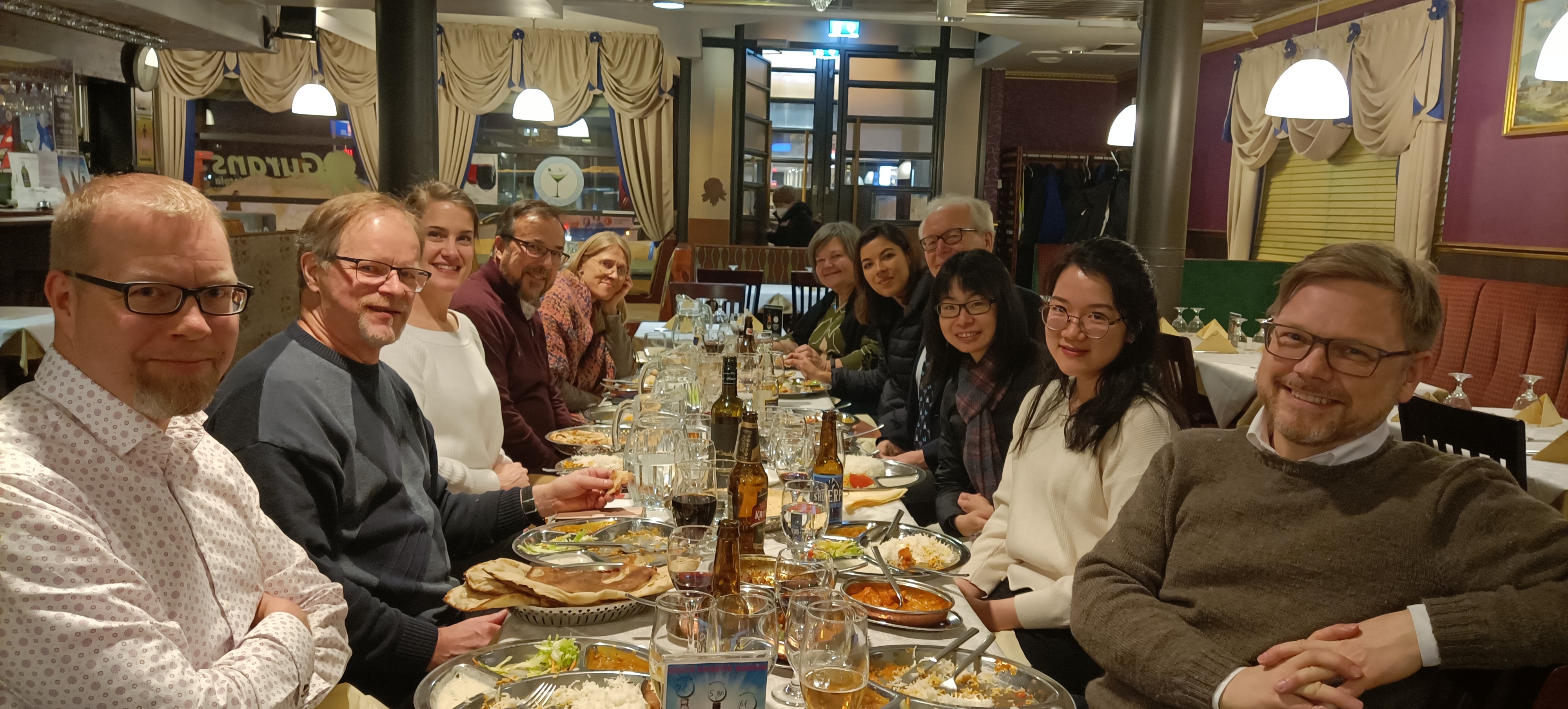
In the beginning of January, three ESR students, Julia, Hang, and Carmen participated in our industrial secondment at MSD Finland. Due to the corona restrictions, the programme was mainly held remotely. During the secondment month, we got the opportunity to meet the MSD team based in Helsinki and obtained an overview of how the global pharma business operates, communicates with the clients and the public, and develops client relationships, through meetings with the Managing Director of Finland, Quality Assurance specialists, Therapy Area Manager, communication specialists, marketing, strategic account, and territory area leads and so on. Furthermore, we learned the important role of the policy lead for reviewing and drafting policy instruments. We were also introduced to pharmacovigilance and medical director who are responsible for the assessment of product safety, prevention of adverse effects of medical products, and communication with doctors and experts.
Moreover, we were invited to a guided tour in MSD Finland with Michael Pasternack, where we were interviewed about our experience of the industrial secondment with MSD under CORVOS. Since the beginning of the industrial secondment, one buddy had been assigned to each of us for preparing their talk for the collaborative webinar ABC of infections and immunity, to be held towards the end of the industrial secondment. We three ESRs chaired, and organized the webinar: ABC of infections and immunity. Together with the invited speakers, who are scientists from the University of Helsinki - Prof. Seppo Meri, Prof. Mikael Skurnik, and Dr. Karita Haapasalo they presented their research field followed by discussion sections with the audience.
A big thanks to Dr. Marjut Puputti-Laurila, Dr. Annette Gylling, and Dr. Riku Korhonen for accompanying and helping us ESRs students to prepare our presentation for the webinar. Finally, we would like to show our deepest gratitude to Michael Pasternack and Tuomas Peltonen from MSD, and Prof. Seppo Meri and Liisa Penttila, for organizing our secondment, which has given us an insightful experience.
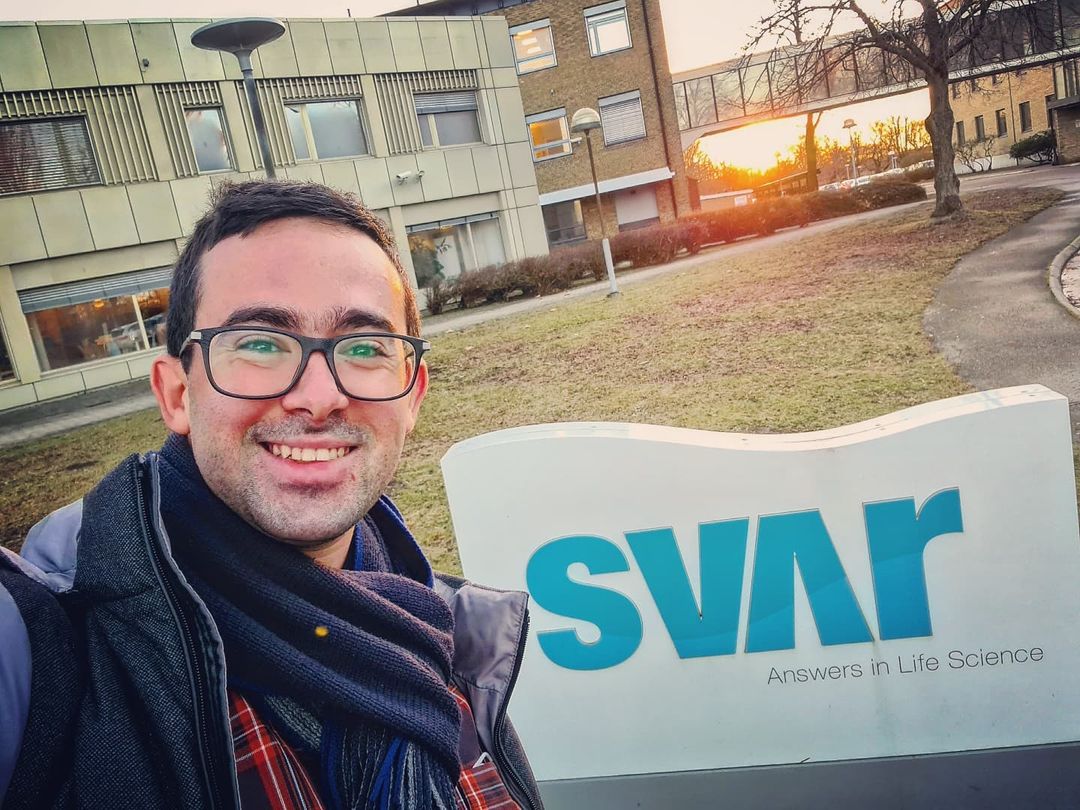
In the early months of 2022, CORVOS ESRs Beatrice Fageräng, Leon Cyranka and Pedro Medeiros had their entrepreneurship training at SVAR, a Swedish company focused on inventing, developing, and applying assay technology for drug development and clinical diagnostics.
During this period, the organization and facilities of the company were shown, as well as new ideas of synergies for the CORVOS' projects together with SVAR's complement portfolio were discussed.
While Beatrice and Pedro had their time dedicated to the development of a commercial C3bc ELISA based on mAb bH6, Leon tested C5aR1 antibodies via the iLite® system.
Special thanks to Anna Prahmed and Katarina Håkansson Frendéus for welcoming our entrepreneurship training and the whole team of SVAR Life Sciences.
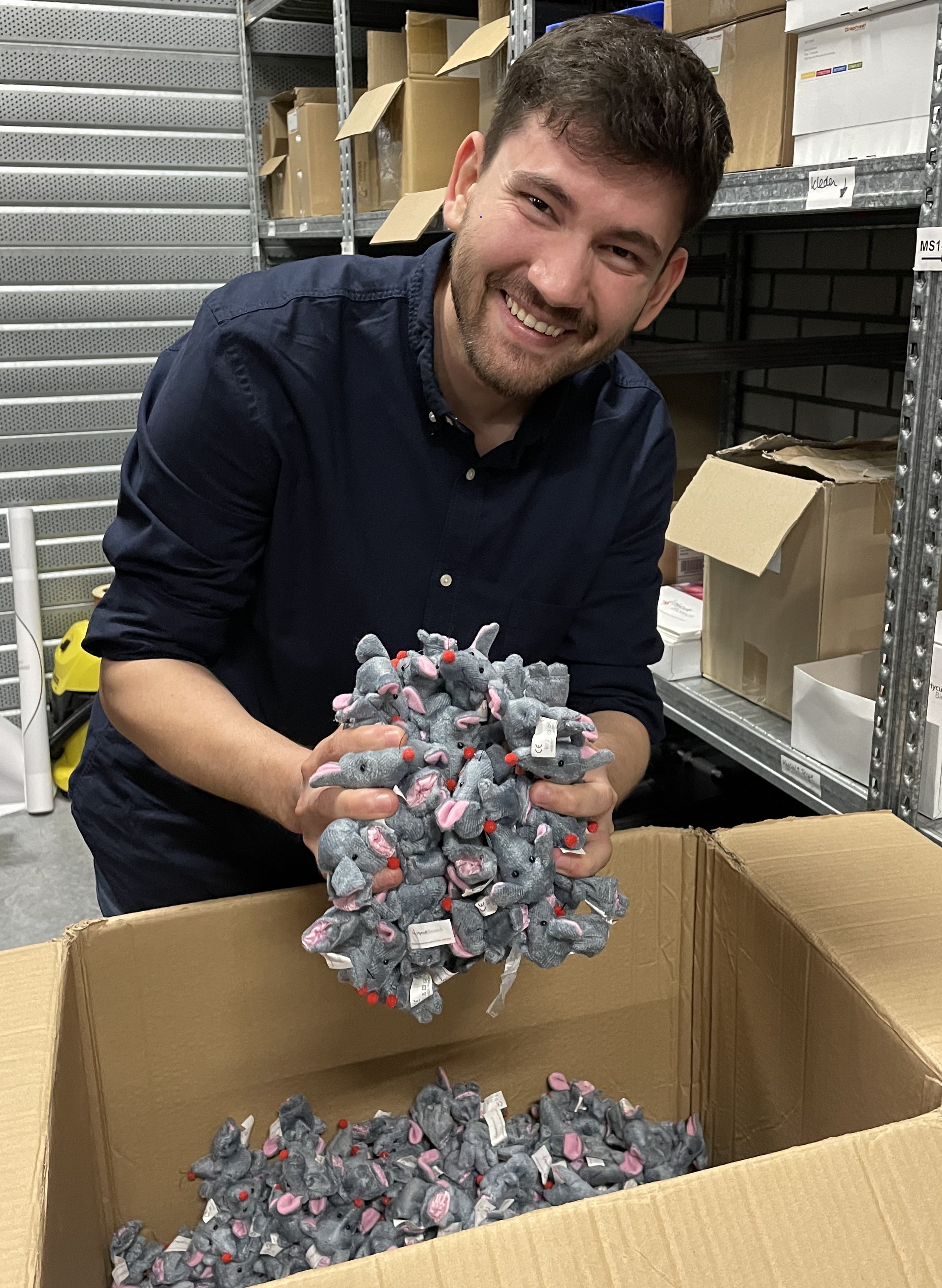
On June 13th 2022, three CORVOS ESRs started their month-long entrepreneurship secondment at Hycult Biotech, Uden, The Netherlands. Each ESR was assigned a business case and a field research topic related to their ongoing PhD projects. Lisa, Mariam, and Janti investigated the value of their assigned topics/biomarkers in RUO, pharma and potential diagnostic value, which research groups are looking into those niche areas, and ongoing clinical studies involving these biomarkers. In the second part of their assignment, each of the ESRs investigated the potential application and trends of complement in chronic kidney diseases and graft rejection, neurodegenerative diseases, and cancer.
While the ESRs were working on their business cases and field research, they also had the opportunity to sit down with different Hycult Biotech employees to learn firsthand about general market validation, customer complaints handling and support, intellectual property and patents, communication and distribution chains, online marketing and industrial validation of products prior to launch. Furthermore, the students also contributed to the organization of the one day Symposium held after the training.
At the end of their entrepreneurship secondment, the ESRs presented their work to Hycult Biotech’s Management Team, R&D as well as Commercial departments. A discussion followed that culminated with constructive feedback from the involved departments to the ESRs.
Special thanks to Loek Willems for organizing our entrepreneurship training and to the whole team of Hycult Biotech for providing us interesting insights into their company.
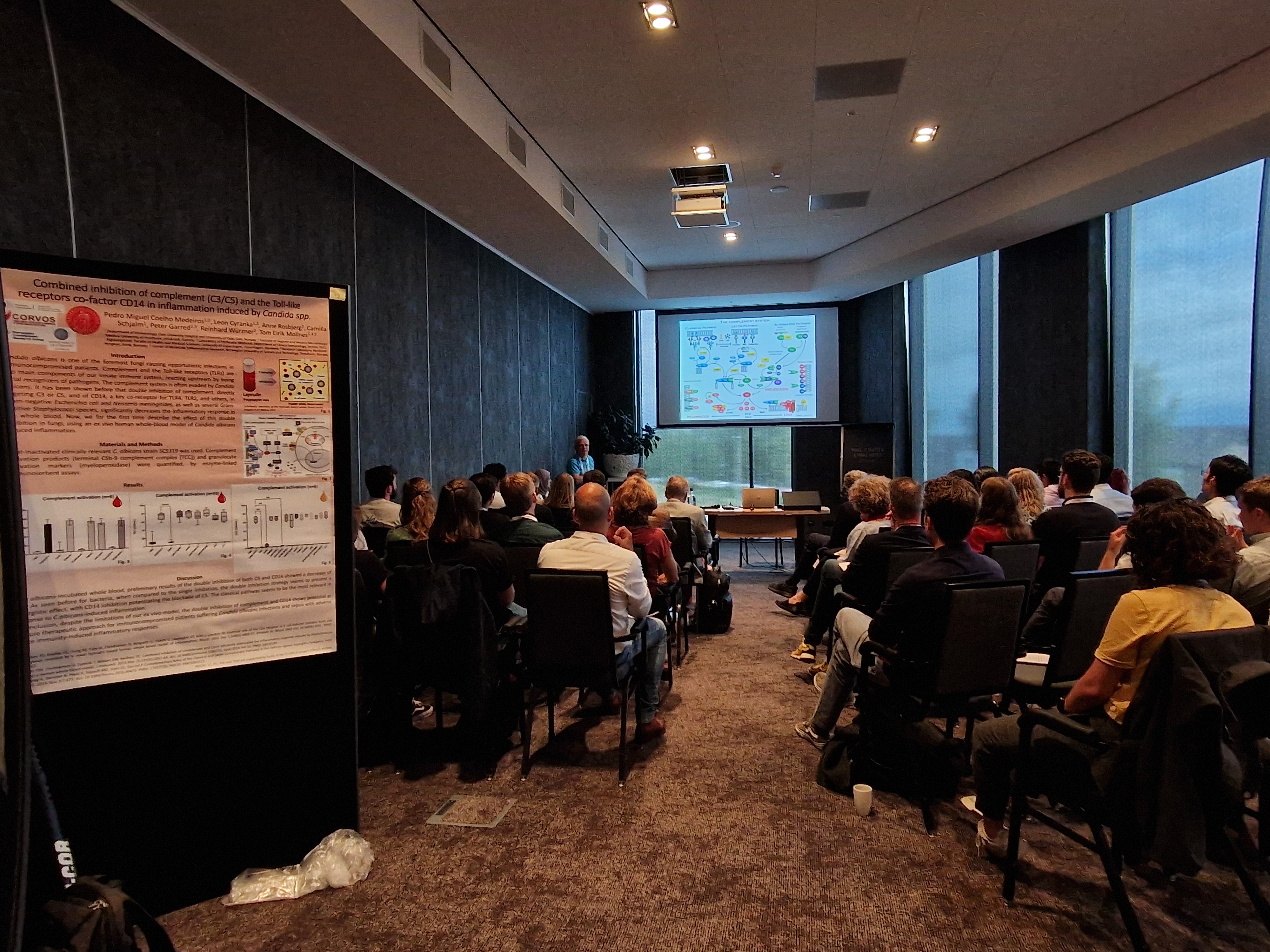
On the 7th of July 2022, CORVOS Faculty Members and students (Early Stage Researchers, ESRs) took an active part in the symposium “Host defense against infection - Complement and beyond”, organized in collaboration with Hycult Biotech, also an industrial partner of the CORVOS programme.
This meeting in Nijmegen (The Netherlands) provided an overview of our current understanding of the role of the complement system in a wide range of infectious diseases including tuberculosis, fungal diseases, and COVID-19. Next, the meeting also focused on diagnosing and treating infections via the modulation of complement.
Speakers from both inside and outside the complement field were present to provide comprehensive overviews concerning the role of complement and pattern recognition receptors (PRPs) in fighting infections. All in all, interdisciplinary investigators from academia and industry were brought together to discuss novel ideas and to set up collaborations which will likely contribute to a better understanding of the role of complement in human infectious diseases.
Following an intense program of scientific discussions, the evening continued with a 3-course dinner at the Restaurant Van der Valk. Furthermore, some of the participants also joined a visit to the facilities of Hycult in Uden the day after.

On the 20th May 2022 the doctoral programmes of excellence, HOROS and CORVOS, joined the Long Night of Research, where teams of researchers made the fascinating world of science visible for the interested general public through experiments, workshops and live presentations in different institutes all around Austria.
At our booth at the Centre for Chemistry and Biochemistry (CCB) in Innsbruck we guided people into our world, showing what our research can do and to which innovations we contribute with our everyday work. From establishing tridimensional lung models to distinguishing healthy or infected tissues under a microscope or checking how many microorganisms we have on our hands, everybody, from children to adults, could actually play with science.
In addition to this, HOROS students Christina Schöpf and Verena Harpf and CORVOS student Giulia Bertacchi presented their PhD programmes together with the coordinator Reinhard Würzner, explaining what it means to be a PhD student and guiding people, especially young women, and made them interested in pursuing a PhD of their choice.
.png)
The Pint of Science festival strives to provide engaging and relevant discussions on cutting-edge research to the general public — and this in bars, pubs, cafes, and other public areas. Beginning of May, scientists from the Medical University of Innsbruck, including Dr. Guido Wollmann, Dr. Zlatko Trajanoski, Dr. Hesso Farhan, Dr. Oliver Schmidt, Dr. Doris Wilflingseder, and Dr. Victoria Klepsch presented their research topics within the fields of Cancer, Immunology, Virology, and Mycology in a relaxed atmosphere at Tribaun. CORVOS was part of this unique event by providing organizational and financial support.
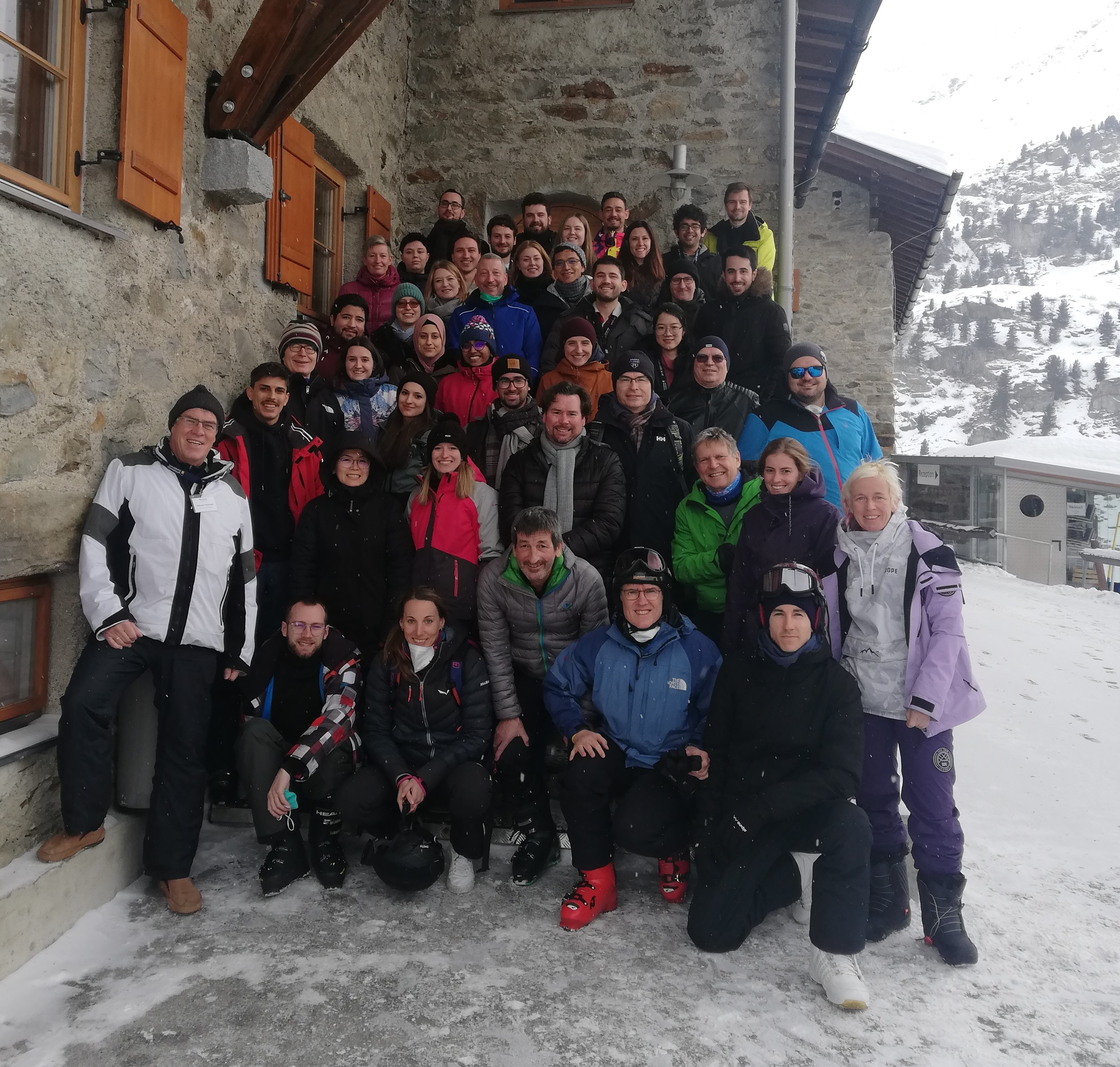
Due to COVID-19 constraints, it was unclear whether the Obergurgl Retreat could resume from January 5th to 10th, 2022, following a one-year break. After all, existing legislation in Austria at the time allowed this event to take place under specific hygienic measures. CORVOS (Complement regulation and variations in opportunistic infections) and HOROS (Host response in opportunistic infections) members were, therefore, able to meet for the first time together with students from the IIT (Infection, Immunity, and Transplantation) program at Obergurgl. It was also a wonderful opportunity to greet incoming HOROS, CORVOS, and IIT students. Furthermore, students and their supervisors got the opportunity to present and discuss their findings within an international environment of scientists. This year's highlight was the presentation of the European Complement Network's (ECN) Gold Medal to Tom Eirik Mollnes for his outstanding scientific contributions to the complement system. Despite the tight schedule, there was time for networking between early-career scientists and principal investigators during activities like skiing, sledding, snowshoeing, and ice-skating.
In mid of December 2020, the CORVOS clinical month in Innsbruck was conducted for six CORVOS students, who did not participate already in the clinical month in Helsinki. Due to then acute COVID-19 restrictions in Austria, this month was shortened to an intensive clinical week, which was also partially attended by the local HOROS students. Preceding the clinical week, the students were offered a series of lectures, addressing the theoretical background behind common medical concepts and the diagnostic procedure for diseases.
During the stay in Innsbruck, the CORVOS students familiarized themselves with the clinical everyday life and medical research of different hospital units, namely Pediatrics, Internal Medicine, Radiology, Anesthesiology, Transplantation, and Traumatology. Introductory courses were given by Professor Reinhard Würzner, who also provided the well-structured CORVOS clinical week schedule and supervision. In addition to clinical work, the students were also able to get hands-on experience in diagnostic seminars, demonstrating the use of important clinical diagnostic tools, like MALDI-TOF.
In addition to the substantial theoretical and practical training, the students were also able to meet in person for the first time after the start of the CORVOS PhD program and share time together by staying in a specially rented house during the week. Additional planned social events, which comprised the visit of the CORVOS program patron Corvus corax (common raven) in the Alpine Zoo Innsbruck, as well as joint dinners, were well perceived by all participating students, with special emphasis on the unique culinary and cultural experience during a joint CORVOS/HOROS dinner at the medieval restaurant “Ritterkuchl”.
After clinical week completion, all students and Professor Reinhard Würzner confirmed that the week was a full success, by not only enabling the students to gain valuable insights into the potential application of their own medical research but also leading to exchange between the students in person for the first time, strengthening the ties within the CORVOS program during the COVID-19 pandemic.
The clinical week Innsbruck 2021 was the first of its kind and might be continued for present HOROS students as well. Special credit must be given to Professor Reinhard Würzner for making this stay possible and tirelessly coordinating between the visited hospital stations, together with CORVOS program coordinators Dr. Marco Grasse and Silke Huber.
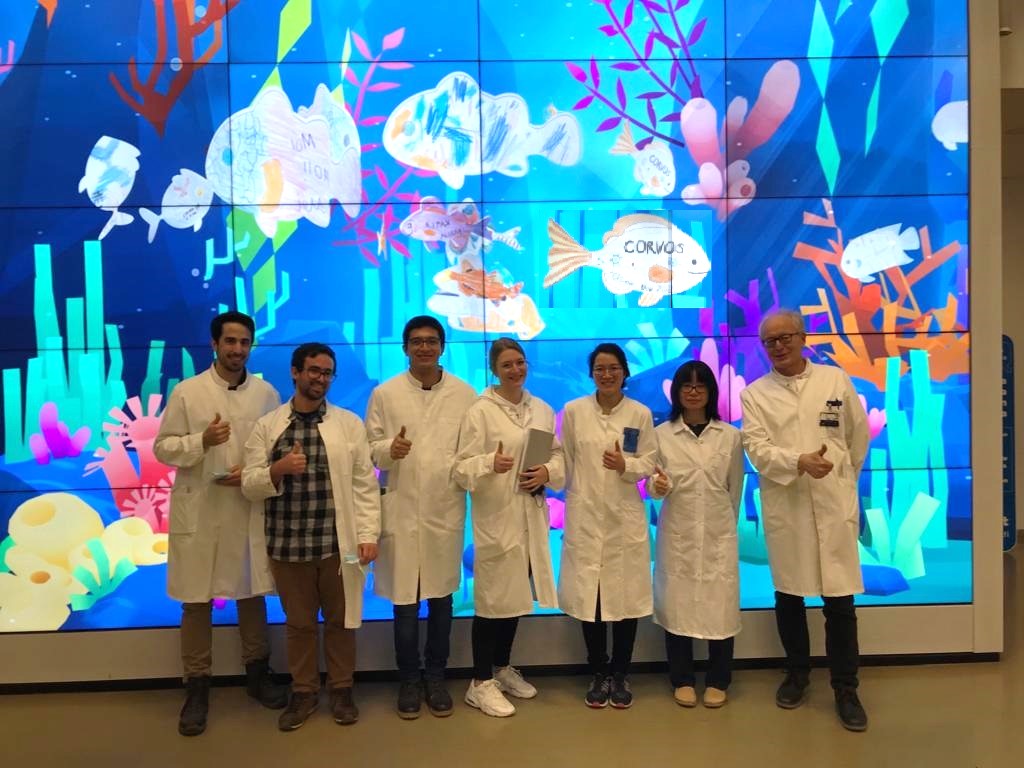
In mid-November 2021, four of the CORVOS ESRs travelled to Helsinki, Finland, to take part in a month-long clinical secondment, together with the two local ESRs.
Hosted by the team of Professor Seppo Meri, the students their own projects in parallel with clinical visits to the Helsinki University Hospital (HUS) “Complement-relevant” wards, namely, the Pediatrics, Nephrology and Hematology clinics, where they could get in touch with patients undergoing complement targeting therapies, a deeper insight in the field, as well as HUSLAB where all the patient samples are analysed. In the New Children's Hospital, CORVOS gained fins as a "fish" in the virtual aquarium of the main lobby. Then, as many Complement diseases present kidney manifestations, it was interesting to see how Eculizumab (a powerful C5 inhibitor) is commonly used in daily practice. Moreover, on the World’s PNH day, a better understanding of how this and other drugs can be used was gained. The visits to the different HUS hospitals further developed our understanding on the Finnish national healthcare system, and the relevance of our research works to medical cares.
Powered by a strong lecture-based start, the students and their mentors presented their projects to each other. Later on, they could follow up their own ideas in the lab, supported by the postdocs and researchers from both the Meri and the Haapasalo groups. For example, the students performed experiments to further characterize anti-C1s, anti-C1INH and anti MASP-1 antibodies, developed at Semmelweis University, Budapest. More precisely, their application was tested in functional ELISAs and flow cytometry experiments. Besides that, in different projects, C1s-C1INH complex levels, SARS-CoV-2 S-protein and N-protein, amongst others, were measured in patient samples and healthy controls, just to name a few.
In the third week of this stay abroad, the students were invited to attend the online ICW 2021 Virtual Workshop in Villa Aikala (Finska läkaresällskapet) and in Billnäs bruk / Fiskars, with a full social program complementary to the virtual program, where, being in Finland, sauna was an unmistakable required activity.
Embedded with the seasonal Christmas spirit, there were many unmissable social activities in December, such as the Department’s Little Christmas Party ("what happens in the LCP stays in the LCP!!"), Christmas Lunches , concerts, and even a visit to the Christmas market and museums in Tallinn, Estonia!
Visiting Seppo Meri's Lab was unanimously one of the best experiences since CORVOS started. The smart and kind senior postdocs are just a sample of the wonderful principal investigator. In this stimulating environment, different perspectives of each ESR's project were enlightened, simultaneously with the possibility to learn basic complement research techniques, as well as fortifying bonds for future collaborations within the network.
All in all, Finland is really an amazing country with very welcoming people, that was worth experiencing at its fullest!!
As the first part of our CORVOS school, all ESRs participated in the teaching symposium held on the first day of the 28th International Complement Virtual Workshop (ICW). Furthermore, our ESRs represented CORVOS at the ICW and presented their research in oral presentations or poster sessions:
|
ESR
|
Name
|
Poster/Talk
|
Title of presentation/contribution
|
|
AT-1
|
Mariam
|
Poster (A13)
|
Complement C7: strong association with clusterin, but no indication for the presence of a modulating alternatively spliced C7-like protein
|
|
AT-2
|
Giulia
|
Poster (A32)
|
Complement opsonized HIV-1 increases TNTs formation in DCs
|
|
DE-1
|
Janti
|
Poster (B44)
|
Generation of monoclonal antibodies targeting murine C5aR2
|
|
DE-2
|
Alejandro
|
Poster (A67)
|
The impact of MBL on the outcome of infection with representative mycobacterial strains of the Mycobacterium tuberculosis complex
|
|
SE-1
|
Michal
|
Poster (A46)
|
Clinical isolates of Acinetobacter spp. are highly serum resistant despite efficient recognition by the complement system.
|
|
IT-1
|
Hang
|
Poster (B83)
|
Role of pentraxin 3 and interaction with complement in immune defense against Plasmodium falciparum
|
|
NL-1
|
Frerich
|
Poster (B08)
|
Differences in Complement Activation and Killing of
Klebsiella pneumoniae isolates |
|
FR-1
|
Julia
|
Poster (A76)
|
Identification of anti-C3bBb antibodies enhancing the formation of the
C3 convertase: a new mechanism of dysregulation of the complement in C3 glomerulopathy |
|
FI-2
|
Mikel
|
Poster(A15)
|
C4bp hijacking by Plasmodium falciparum circumsporozoite protein
|
|
DK-1
|
Maximilian
|
Talk
|
Development of an ELISA for characterization of mannose-binding lectin-associated serine protease 2 (MASP-2) in human plasma
|
|
DK-2
|
Leon
|
Poster (B34)
|
Generation of anaphylatoxin receptor-targeted monoclonal antibodies
|
|
NO-1
|
Beatrice
|
Poster (A62)
|
Characterization of a novel anti-C1s clone inhibiting the classical complement pathway
|
|
NO-2
|
Pedro
|
Poster (A03)
|
Vitamin C, hydrocortisone, and the combination thereof significantly inhibited two of nine inflammatory markers induced by E. coli but not by S. aureus – when incubated in human whole blood
|
|
HU-1
|
Lisa
|
Talk
|
Development of Immunoassays for Specific Classical and Lectin Pathway Activation Markers and Investigation of Complement Activation in
COVID-19 |
Carmen has just recently started and therefore she was actively participating in the conference. Besides improving presentation skills and learning about projects of other complementologists, there was also time for some networking beneficial for CORVOS students.
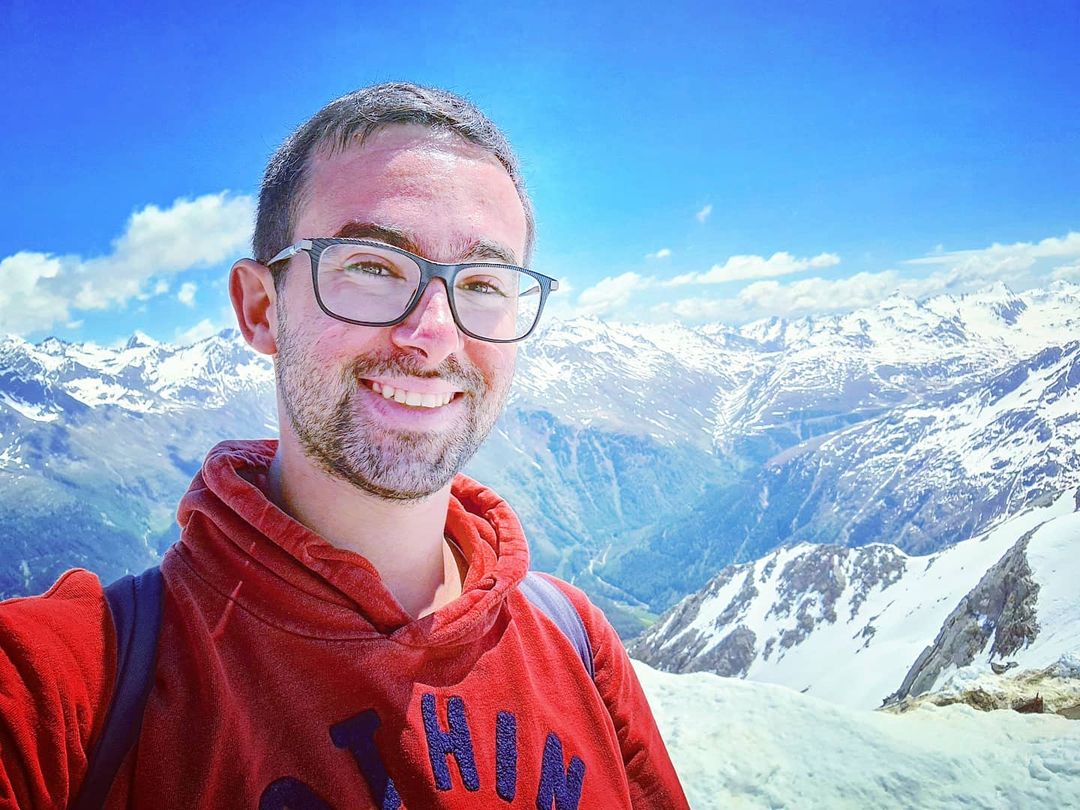
Hey everyone, I am Pedro, the ESR from Oslo, Norway, and I have spent the last two months in my first secondment in Innsbruck, Tirol, Austria.
Returning to where it all started, a different Austria from the eastern flatness of Vienna... surrounded by the mountains, but still drowned in bureaucracy. Halfway stop between Berlin and Rome, Innsbruck has always been a welcoming stop to rest in-between great trips. Thus, it felt nothing other than adequate to have this secondment, right in the middle of my PhD, in the very birthplace of CORVOS.
The Tiroler weather in the Summer oscillates between wet heavy rains and scorching sunny days. Arriving in the midst of dissipating health-imposed restrictions, Central Europe presents itself with a myriad of possibilities for a such awaited summer of 2021.
Coming from Norway, I found as many differences as similarities between the two regions. It's fun to notice in Norway they call the Lyngen Alps, the Sunnmøre Alps, etc, to any mountainous area emanating natural beauty, in contrast to Austria, where one can find Achensee, the "Fjord of the Alps". So, as both countries get to envy eachother's wonders, with Corvos, I have the chance to get a taste of both. While in Norway, the Summer Sun barely sets below the horizon, in Austria, it quickly disappears behind the mountainous high peaks that extend beyond eyesight.
I have to thank Marco and Verena, as well as Silke, Mariam and Professor Würzner for all the support establishing myself in a lab of a foreign land. In Oslo, I got acquainted with the double inhibition model by Professor Mollnes, where the complement system is targeted both at the C5 level, as well as upstream with CD14/TLR4. Now, in Innsbruck, I get to apply this strategy to a new model, by learning foundation skills of mycology and how to grow fungi in the lab.
For all these reasons, I cannot thank Corvos enough for the opportunity to grow both at a personal and professional level, surrounded with such a wonderful natural scenery of the Austrian Alps.

I am currently doing my research secondment in the lab of Prof. Seppo Meri in Helsinki. This has brought me the possibility to live in one of the most beautiful countries in Europe - Finland.
The first thing that I will always remember so deeply is the friendly nature of the Finnish people! Liisa, the administrative officer in the host lab, has been so supportive to all new students, and virtually to everyone. She was a huge help in organizing an accommodation in the city and also the travel to Helsinki, which allowed me to pre-settle months before. Once meeting her, one would be so impressed with her considerate and loving nature, her openness and generosity! With her, everything is very ordered.
In the first week I had a tea session with Prof. Meri and his two CORVOS students Jacob and Mikel, discussing our projects. The aim of my secondment is to investigate the interplay between long pentraxin 3 (PTX3), complement and malaria, starting with the binding tests of PTX3 and the different complement components (such as C1q - C9) to the various stages of malaria parasites, using immunofluorescence.
I was introduced to a lot of new people in the lab. It was an adventure to visit the different buildings of the Haartman-instituutti and the University of Helsinki, including one of the libraries just across the street, which contains a lot of interesting elements besides the architecture design itself.
We had a retreat to the Nuuksio National Park in October, which was a memorable experience. People from the Complement Group and Inflammation and Infections Group went into the nature for having a BBQ and enjoying sauna! The pit was located inside a tribal village house with real furs on the long benches and an open chimney in the center above the pit. It was an awesome experience.
In general, Finland is a country with everything that make you wonder. The randomly picked architectures on the street, the unlimited ultrafast data package showcasing its telecommunication technology, the music conservatories, the monumental post- Romantic composer Sibelius, whose work, Finlandia, which Prof. Meri had shared among the group during Christmas, the sport stadiums, the 24-hour supermarkets, and most importantly, the extremely friendly English-speaking Finnish people! Kids on the street were very adorable, and the adults looked so bright.
The year of 2020 concluded with the festive Christmas time in the city. The festival was still celebrated during the special time - "zoom Christmas". The Secret Treasure Christmas calendar in the kitchen of the lab reminded me that everything I saw during childhood about the snow, the cartoons of people, the animals, the trees, and the buildings, from the story books -they are real! A snowy Helsinki is the one that I will never forget.

Hey there, I am Lisa. Officially I am based in Zoltán Prohaszka’s lab at Semmelweis University in Budapest, Hungary, but at the moment I am doing my 6-month industrial secondment at Hycult Biotech in Uden, The Netherlands. Hycult Biotech is a partner of the CORVOS project and a Dutch company with lots of experience developing and producing research reagents and diagnostic assays in the field of innate immunity, especially complement.
I came to the Netherlands in October 2020 and since then I am working on the development of the C1INH complex assays in Hycult’s R&D team. Although I am currently the only non-Dutch speaking person working in the company and all my colleagues have to switch to English only because of me, that does not seem to be a problem at all and I felt very welcome from the beginning. I have good supervision here and besides developing and optimizing my immunoassays, I can also gain some experience in large scale production of the assay components and I am getting an impression of how basic research is translated into commercial products.
For the 6 months I am living in Nijmegen, the oldest city of the Netherlands, which has approximately 200.000 inhabitants and is located quite close to the German border. From here it takes about half an hour to get to work, but luckily Hycult is providing me a small car for the time of my stay. Also, in general my colleagues here are super helpful, no matter if I can’t find reagents in the lab, need advice about Dutch supermarkets or even a COVID-test.
I am enjoying my time here and looking forward to my remaining months at Hycult. Maybe the pandemic situation is improving in spring, so I will be able to also discover a bit more of the Netherlands in my free time before going back to Budapest.
Best wishes from the Netherlands,
Lisa
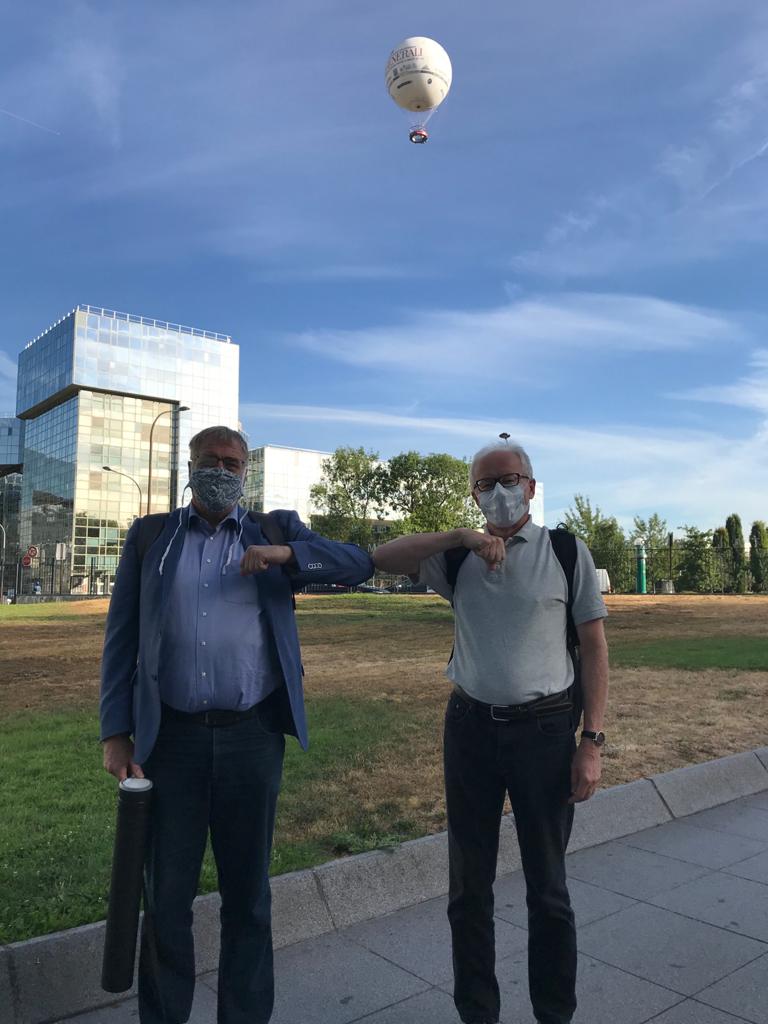
The last CORVOS interviews took place on August 5th - 6th, 2020 at the Hopital Européen Georges Pompidou in Paris. One of the CORVOS faculty members, Veronique Fremeaux-Bacchi, works there. Six candidates were invited for two CORVOS PhD positions that are directly linked to one another: the FR-1 project and the FI-2 project. The FR-1 project fellow will work for two years in the laboratories of Veronique Fremeaux-Bacchi in Paris and one year in the laboratories of Seppo Meri in Helsinki. The Fellow of the FI-2 project will do it the other way around - two years in Helsinki and one year in Paris.
We were very happy that everyone was able to travel to Paris during this difficult pandemic. We had beautiful weather with sun and an air temperature of more than 30°C. On the evening of August 5th we met for dinner and to “get to know each other”. Both projects were presented by Veronique Fremeaux-Bacchi and Seppo Meri, followed by individual discussions on the topics.
On August 6th we met in the hospital and the candidates presented themselves and their research experience with the CORVOS selection committee. The selection was very difficult as all candidates were of high quality. Finally, the two selected candidates accepted our offer to become MSCA CORVOS scholars and will start to work on their projects at the beginning of October.
The picture shows the head of the FI-2 project, Seppo Meri, and the CORVOS spokesman, Reinhard Würzner, in front of the Européen Georges Pompidou hospital in Paris.
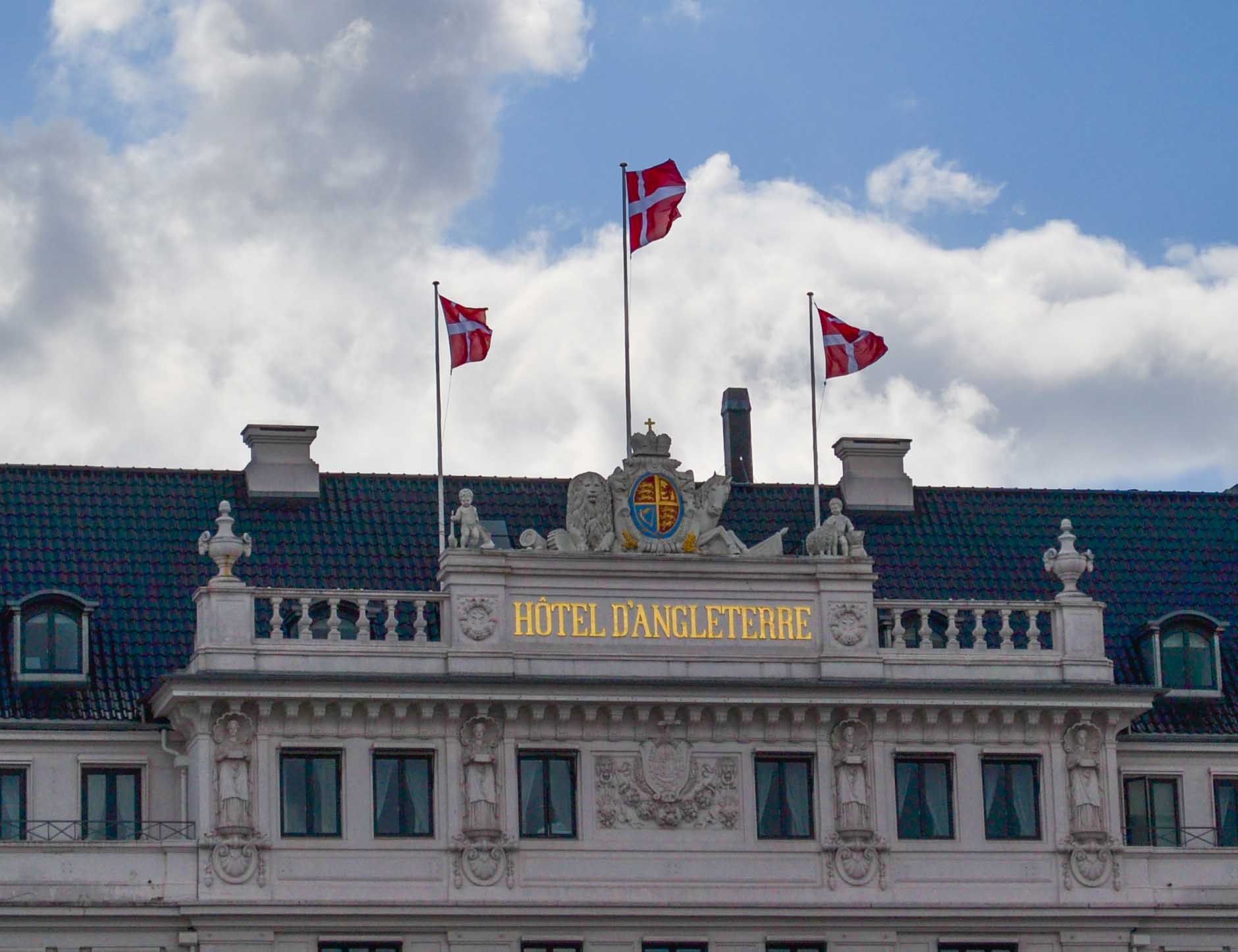
The second round of CORVOS interviews was held in Copenhagen on the 30.06. – 01.07.2020. Nine candidates were invited to recruit in total 3 researchers for the projects DE-1, NO-1 and DK-2. It was a difficult organization due to the SARS-CoV-2 pandemic, as we had to make sure, that every candidate and also the members of the selection committee were able to enter Denmark. Due to travel restrictions, we already had to move the interviews for the projects FR-1 and FI-2 to Paris at the beginning of August.
Fortunately, everyone made it to Copenhagen, so that Prof. Würzner could open the hearings with a detailed presentation on what CORVOS is about. The evening continued with poster-presentations from the PIs on the individual projects, followed by interesting discussions with the candidates. Delicious Sushi-food and cool drinks were served during the evening. It was a nice opportunity for the candidates and the CORVOS faculty to get to know each other a little better.
The next day continued with the candidate presentations. Each candidate had to give a 20 min presentation in front of the selection committee, followed by a question/answer session. All presentations were very interesting and very individual. In the end it was an extremely difficult choice for the selection committee, as all candidates proofed their excellent ability to become a MSCA-fellow. We are looking forward to welcome the finally chosen candidates in our labs by the end of summer/beginning of autumn.
photocredits: M.Götz
Effective from February 2020, the godparentship for the raven in the Alpine Zoo of Innsbruck was renewed. HOROS, which was a one of the very strong influencers for the creation of CORVOS, actually plans to visit the raven, the patron of CORVOS, in the Alpine Zoo of Innsbruck. On the occasion of this visit, planned on the 6th of July, an internal review of the programme will be held to reveal possible areas of improvement.
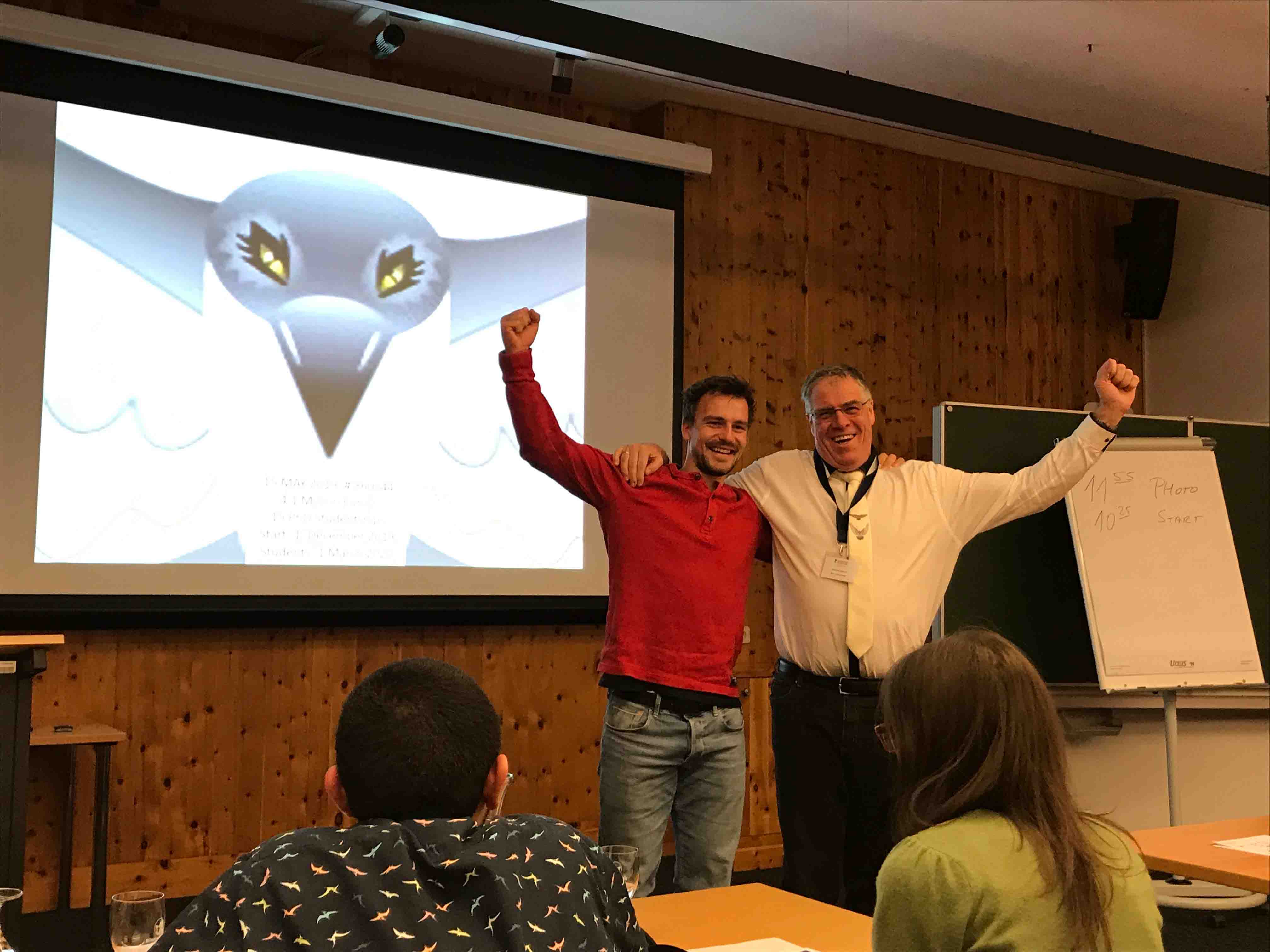
CORVOS, the European joint doctorate programme which got approved in MAY 2019 as Innovative Training Network within the MARIE SKLODOWSKA-CURIE ACTIONS, financed by the Horizon2020 project of the European Commission, has now started on 1 DEC 2019. The Kick-off meeting and celebration (see photo) was in Obergurgl, Austria in early JAN 2020. The acronym CORVOS stands for COmplement Regulation and Variations in Opportunistic infectionS.
The pan-European initiative of 10 European universities, 3 biomedical companies, 2 research institutes and 3 hospitals comprises an interdisciplinary doctoral programme including cross-sectoral research secondments (stays abroad) and training in transferable skills. CORVOS will educate 15 highly motivated PhD students to fill the current scientific gap in the understanding of the role of complement in opportunistic infections. The young scientists will become creative alumni equipped with entrepreneurial and clinical skills, making them attractive human resources to academia and industry alike.
The European Union provides 4.1 Mio. € for this ambitious programme. Reinhard Würzner is the coordinator, who is assisted by Marco Grasse, both from the Institute of Hygiene and Med. Microbiology (Head: Cornelia Lass-Flörl).
Eleven out of the 15 PhD positions were advertised in autumn 2019 (10 SEP-10 NOV) and the first successful hearings were in early JAN 2020. Twenty-two candidates from 16 different nations were invited. The so far selected 10 candidates come from 8 nations (Italy, France, Germany, Poland, Portugal, United States, Columbia, China).
The raven, corvus corax, symbol for wisdom in the Nordic mythology, and in particular the bird in the Alpine Zoo in Innsbruck, has been the patron for the programme already from application phase. The first scientific projects will start 1 MAR 2020.
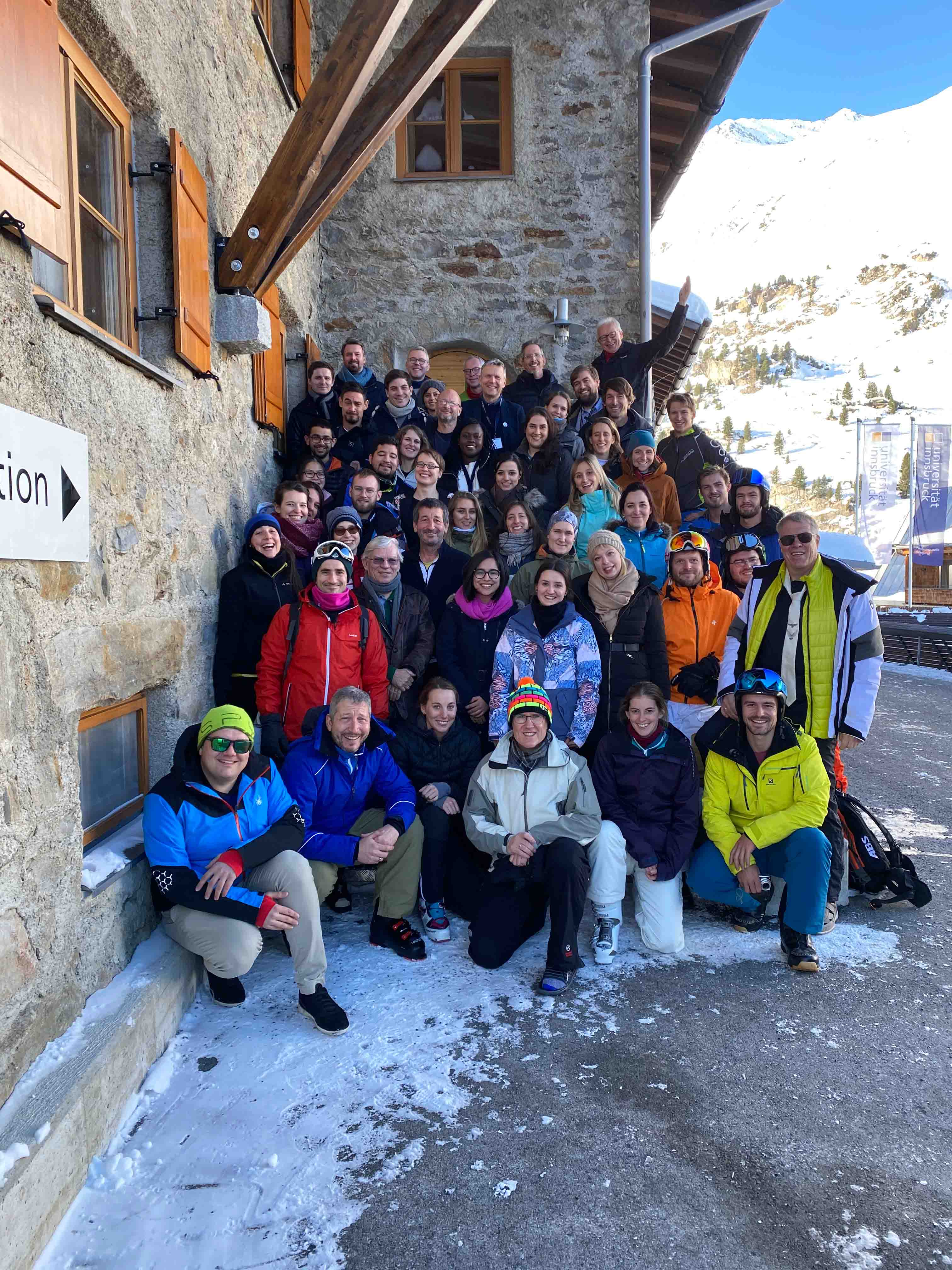
The first CORVOS meeting was a big synergy with the Austrian sister program on opportunistic infections HOROS. The CORVOS faculty had their kick-off meeting integrated into a joint doctoral retreat on immunity, infection, complement, and allergy, which took place from 04th - 09th of January 2020 in Obergurgl, Austria. They discussed the implementation of the CORVOS project. All the individual PhD projects are linked with each other and the fine tuning is critical for the successful outcome of this European initiative. The meeting was extremely fruitful and everyone is looking forward to make it happen!
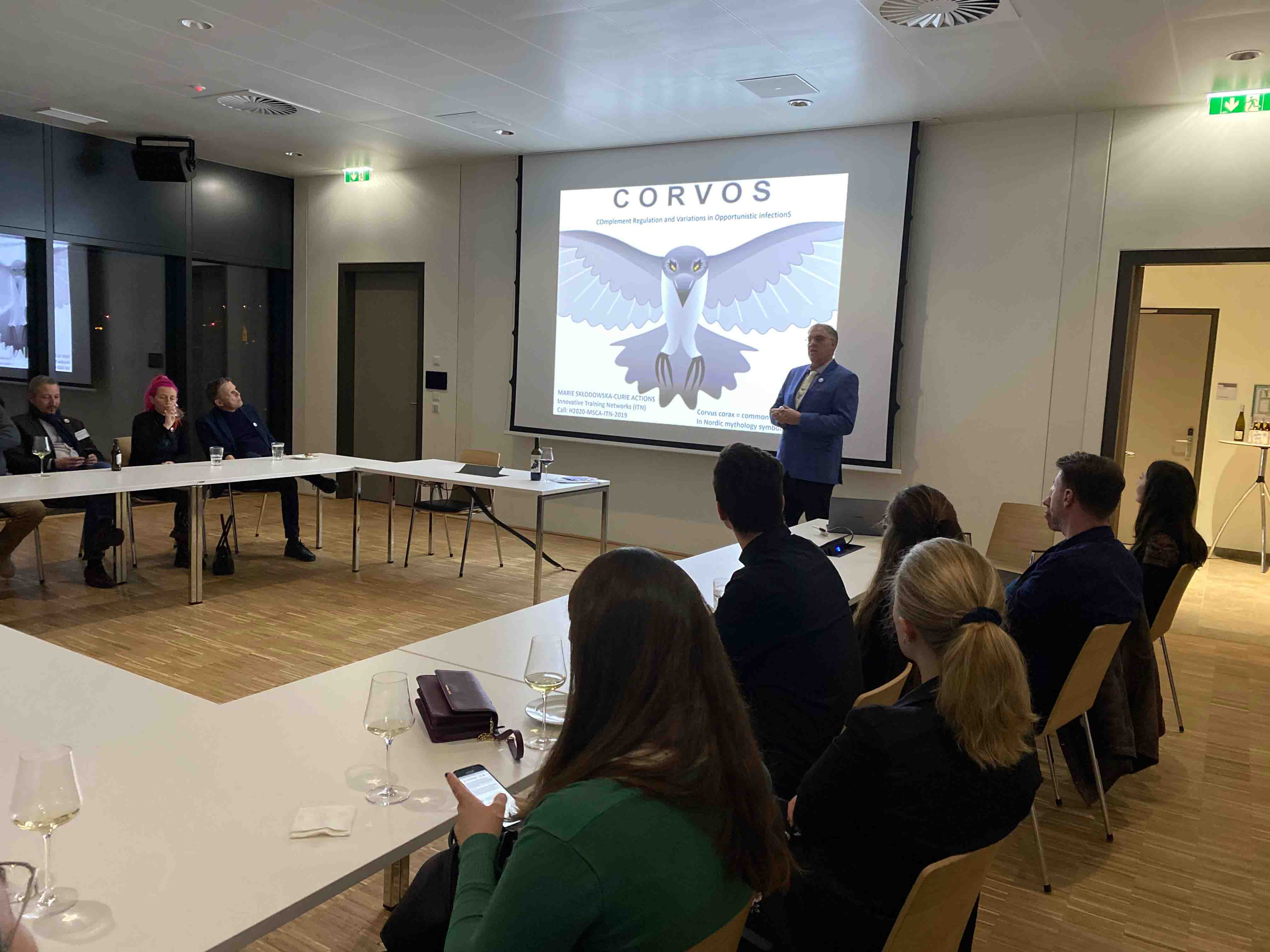
The year 2020 started with the interviews for 11 advertised CORVOS-PhD positions. Out of 360 applicants the best 22 candidates were invited to Innsbruck for an intense hearing. The candidates had to present themselves and their biggest research project in front of the CORVOS faculty. Moreover, they were introduced to their potential future supervisors and had the chance to discuss the projects more in detail. It will be very hard for the CORVOS faculty to choose between the candidates, as they are all extremely good ones.
The invited candidates originate from 16 different nations and four different continents.

This is the first official day of the EU project CORVOS – 01st December 2019. We have four exciting years in front of us. Young researchers will be trained, interesting research questions will be tackled, new wires for a European knowledge transfer will be set and the Complement network will grow bigger and bigger. Although the financial support from the EU, and thus the official project will end on 30th November 2023, the CORVOS idea will exist much longer.

The European Joint Doctorate CORVOS will offer 15 PhD positions in total. This first call is for 11 positions and will be open from 10th September - 10th November 2019. The interviews of selected candidates will be on 03rd/04th or 09th of January 2020. Please, reserve both dates! The selected stipendiates will finally start to work in March 2020. Please visit our application-page for more details.
There will be a second call from March - May for 4 more PhD positions.

The European joint doctorate CORVOS got approved as Innovative Training Network within the MARIE SKLODOWSKA-CURIE ACTIONS, financed by the Horizon2020 project of the European Commission! The acronym CORVOS stands for COmplement Regulation and Variations in Opportunistic infectionS. The pan-European initiative of 10 European universities, 3 biomedical companies, 2 research institutes and 3 hospitals comprises an interdisciplinary doctoral programme including cross-sectoral secondments and training in transferrable skills. CORVOS will educate 15 highly motivated PhD students to fill the current scientific gap in the understanding of the role of complement in opportunistic infections. The young scientists will become creative alumni equipped with entrepreneurial and clinical skills, making them attractive human resources to academia and industry alike. The European Union provides 4.1 mio. € for this ambitious programme, which will be coordinated from the Medical University of Innsbruck. More info on CORVOS here.
The project will start officially on 01st of December 2019. The first Call for open PhD position will be from 10th of September - 10th of November 2019, followed by interviews for selected PhD candidates in the beginning of January 2020. The first scientific projects will start 02nd of March 2020.
The CORVOS-Homepage was closed on the 30th of April 2025, i.e. 15 months after the official end, and there will be no more entries or changes. We wish all the students who were supported by this programme and have successfully defended their thesis by 30th April all the best for their future. These best wishes are extended to those students who have not yet finished and are - in most cases - presently kindly supported by funds of their supervisors.

Together, these three studies form a cohesive body of work that significantly advances our understanding of the complement system in various clinical contexts. The novel antibody targeting C5aR1 offers a promising therapeutic tool, while the stem cell transplantation study challenges our understanding of immune dynamics during transplantation. Finally, the exploration of complement modulation in whole blood emphasizes the potential of complement-targeted therapies in infectious diseases.
The successful defense marks the culmination of years of rigorous research and sets the stage for further advancements in the field. As the research moves forward, it holds promise for better therapeutic strategies for autoimmune diseases, transplantation, and infectious diseases.
.jpeg)
We are happy to share that Julia successfully defended her PhD in Paris on December 18th, 2024. Her doctoral dissertation focussed on acquired abnormalities in complement-mediated glomerulonephritis, and highlighted three studies :
Study I: Functional characterization of anti-C3bBb autoantibodies and C3 Glomerulopathy phenotype. Julia has developed new biochemical assays to identify IgG autoantibodies targeting the C3BbB convertase, and found association of autoantibodies function with the complement alternative pathway overactivation and the disease severity of C3 Glomerulopathy.
Study II: Spectrum of anti-factor B associated glomerular diseases in adults. Julia highlighted that anti-Factor B was strongly associated with infection-associated glomerulonephritis. The functional characterization of these autoantibodies highlighted the proconvertase C3bB formation and the C3bBb stabilization as two important mechanisms of alternative pathway dysregulation.
Overall this work provides new pieces in our understanding of the pathophysiology of complement-mediated glomerulopathies but also paves the way for the use of new diagnostic assays for C3bBb convertase targeting autoantibodies and complement-targeted therapies to improve patient outcomes.

On a cold December day in Helsinki, the 13th December 2024, Mikel Rezola Artero defended his PhD successfully to gain a PhD from University of Helsinki and University Sorbonne in Paris. In his thesis, entitled “Mechanisms of complement subversion in Infection and cancer” he compared the evasion strategies pathogens and tumour cells employ to evade the complement system.
On the pathogen side, he explored how P. falciparum sporozoites resist complement attack through hijacking of the complement regulator C4b binding protein (C4bp).
On the tumour side, he investigated the mechanism behind the pro-tumoural role of intracellular factor H (FH) by a combination of transcriptomics in patient tumours, cellular and biochemical assays that demonstrated that intracellular FH acts as a multitasking tumour-promoting effector by regulating cell cycle progression and by maintaining cytoskeleton organization.
Thus both pathogens and tumour cells employ different, but on the other hand, similar mechanisms.
Ruben Pio Oses, Navarra, Spain, who was also a referee of the thesis earlier, acted as opponent. The other referee, and speaker of CORVOS, Reinhard Würzner, Innsbruck, Austria, was also in the evaluation committee on site. The two supervisors, Seppo Meri, Helsinki, Finland and Loubka Roumenina, Sorbonne, Paris, France were also present. The evening before, the candidate and the invited guests met at a typical Karelian restaurant and after the defence in the prestigious and picturesque Villa Aikala with a Lebanese buffet.
Congratulations to Mikel for his remarkable accomplishment!

We are pleased to announce that Michal successfully defended his PhD thesis on October 25, 2024. His work focused on the complement evasion mechanisms developed by human pathogens, mainly Acinetobacter baumannii, Klebsiella pneumoniae, and Streptococcus pyogenes.
Papers I and II were dedicated to A. baumannii, a worrisome complement and antibiotic-resistant pathogen. In these papers, Michal screened many isolates from the genus Acinetobacter and aimed to characterize their MAC evasion strategy. He found two potential mechanisms worthy of further investigation.
In paper III, the focus switched to K. pneumoniae, another serious human pathogen. This study highlighted a surprising connection between complement and colistin resistance in isolates obtained from patients. This study delivered results worth considering in the epidemiology of Klebsiella infections.
Paper IV aimed to provide a treatment option that counteracts the complement evasion mechanism in S. pyogenes. This bacterium acquires the complement inhibitor factor H from serum to evade opsonization. Replacing the serum-bound inhibitor with the FH6-7/hFc fusion protein increased complement activation and resulted in better animal survival in the mouse model. This protein highlighted the possibility of using bacterial evasion mechanisms against the bacteria themselves.
Taken together, Michal's findings gave us a better overview of bacterial infections and their complement evasion mechanisms. As antibiotic resistance among human pathogens becomes more serious, novel treatment options are needed.
We wish Michal all the best for his future career and research projects.

On October 3rd, Frerich successfully defended his doctoral dissertation in Utrecht. His thesis provided valuable insights into how Gram-negative bacteria escape killing via the complement system.
Frerich’s research comprised of four studies:
The findings highlight the complexity of bacterial immune evasion and the potential for targeting these resistance pathways in the development of new antimicrobial strategies.

The European Meeting on Complement in Human Disease, Lübeck, 2024, organized by Jörg Köhl and his team was the official international farewell event for CORVOS with a concluding meeting.
The final report had been accepted well before and the speaker, Reinhard Würzner, was proud to announce that all projects were successfully accomplished (due to the Corona crisis some had to be changed, though, but most actually to the better and a lot of CoCo papers (for Complement & Corona) were published by the CORVOS consortium). After the meeting the consortium met at the Schiffergesellschaft where the Speaker delivered some final words and the CORVOS aprons in the courtyard. The dinner was afterwards in the very picturesque halls.
Time to say goodbye to some members of the consortium, but others were looking forward to another Obergurgl retreat in early January 2025. Thus, CORVOS is still flying....

We are delighted to congratulate Max on successfully completing his PhD! His thesis provided valuable insights into the role of the complement system in the innate immune response, focusing on the pathogens SARS-CoV-2 and Aspergillus fumigatus.
Max's research comprised three significant studies:
(1) Max developed a sensitive MASP-2 ELISA to investigate its association with COVID-19. He found that MASP-2 concentrations were significantly increased in COVID-19 patients compared to healthy controls and correlated with age, female sex, and higher mortality. Additionally, MASP-2 levels were linked with terminal complement complex (TCC), ficolin-2, ficolin-3, and C-reactive protein (CRP), suggesting MASP-2 as a potential biomarker for COVID-19.
(2) By exploring the binding kinetics of pattern recognition molecules (PRMs) of the complement system on pathogen surfaces, Max discovered that C1q and MBL rapidly bound and then detached from pathogen surfaces within minutes in plasma, a process associated with complement cascade activation. C1q detachment was linked to the activation of the C1 complex, while MBL dissociation relied on overall complement activation and solubilization via C3b.
(3) Max investigated the innate immune responses to A. fumigatus in whole blood, finding that it triggered complement and leukocyte activation, similar to E. coli. Although A. fumigatus induced a less extensive cytokine response compared to E. coli, complement inhibition significantly altered the release of six key cytokines, indicating the complement system's role in cytokine release. The expression of most cytokines depended on the monocyte fraction in whole blood.
Collectively, these studies demonstrate the significant role of the complement system in infections with SARS-CoV-2 and A. fumigatus. Max's work highlights the potential connections between cytokine release, pathogen opsonization, and the detachment of C1q and MBL from microorganisms, though further research is needed to fully understand these mechanisms.
We wish Max the best of luck for his future academic career.

We are thrilled to announce that Beatrice has successfully graduated with her PhD! Her thesis explored the human innate immune system using the lepirudin whole blood model. This model, introduced in 2002, uses the anticoagulant lepirudin to maintain complement system function while preventing blood coagulation. Beatrice's work involved collecting blood in lepirudin-treated tubes, exposing it to various activators, and analyzing cell activation markers, complement activation, and inflammatory mediators.
Beatrice's thesis consisted of three significant papers:
Paper I: Beatrice developed a novel model by selectively removing individual cell populations, revealing the specific roles of monocytes and granulocytes in cytokine release. This study was published in the Journal of Leukocyte Biology.
Paper II: She investigated the inflammatory response to Aspergillus fumigatus conidia compared to Escherichia coli, identifying CD14+ monocytes as key contributors to cytokine release. This paper was published in the Journal of Innate Immunity.
Paper III: Beatrice adapted the model to study patients with acute myelogenic leukemia (AML) undergoing hematopoietic stem cell transplant (HSCT). The study showed that AML patients maintain a functional complement system throughout the transplantation period. This paper is under revision for publication in Frontiers in Immunology.
Collectively, these papers enhance our understanding of innate immune responses and pave the way for new targeted therapeutic strategies.
We are incredibly proud of Beatrice's achievements and wish her all the best in her scientific career.

On the 11th June 2024 two CORVOS ESRs Hang Zhong (IT-1) and Mikel Rezola Artero (FI-2) participated in the 16th International Conference on Complement Therapeutics. They showcased their research through oral presentations and flash poster talk sessions which stimulated scientific discussion and provided invaluable feedback on both projects.
This meeting in Loutraki, Greece, provided an opportunity to bring together complement experts from both academia and industry. Participants shared new data and discussed the latest developments in therapeutic design, clinical trials, and new aspects of complement-driven pathophysiology.
Following an intense, one week program on a wide variety of topics ranging from complement-driven haematological/ocular/kidney/neurological disorders to complement in infectious diseases, the conference finished with a farewell dinner where all the participants enjoyed live music and had the opportunity to learn some local dances. Finally, the evening culminated in the announcement of the awards, where both of the ESRs received trainee awards due to their commendable contributions to the conference.

We are delighted to announce that Mariam has successfully completed her PhD! Her research focused on the complement system, specifically the component C7, which is crucial for the assembly of the membrane attack complex (MAC). While the structure and function of C7 in MAC assembly are well documented, Mariam's work aimed to uncover the non-canonical roles of C7, which are less understood. Mariam's thesis explored several key areas: (1) Extrahepatic Synthesis of C7: Unlike most complement proteins, C7 is primarily synthesized outside the liver, allowing it to regulate local MAC assembly. This unique synthesis pathway suggests that C7 could play distinct roles in different tissues. (2) Association with Disease Pathogenesis: Emerging studies have linked C7 with various diseases, highlighting the need for further investigation into its non-canonical functions. (3) Development of Monoclonal Antibodies (mAbs) and Immunoassays: A major aim of Mariam's research was to create reliable tools for characterizing C7. She developed monoclonal antibodies that specifically bind to native C7, which were then used to establish an enzyme-linked immunosorbent assay (ELISA) for measuring C7 in different matrices. This novel ELISA demonstrated high specificity and no cross-reactivity with similar proteins. (4) Interaction with Clusterin (CLU): Mariam's investigation into the regulatory role of C7 revealed a significant association with the complement inhibitor clusterin (CLU). Her work indicated the presence of a C7-CLU complex in circulation, suggesting that C7 has multifunctional roles beyond its traditional functions in MAC assembly.
Mariam's innovative research has provided new insights into the complex roles of C7 and developed valuable tools for future studies. We are incredibly proud of her accomplishments and wish her all the best in her scientific career.


The International Complement Workshop in Newcastle, organized by Kevin Marchbank and Claire Harris and their team was the first complement meeting in person of the International Complement Society to be organised after the Corona crisis. In Berlin 2021, it was quite funny to chase people virtually in poster viewing rooms and it was great to hear good science and to keep contact, but it is simply not the same thing to meet in person. Thus, a lot of CORVOS housekeeping issues were discussed in person, including an official CORVOS Supervisory Board Meeting, organised by the CORVOS & HOROS administrator Silke Huber.
Now, after so many students being quite advanced, the networking in the evening in the bars was a highlight. The CORVOS students met for a dinner with their supervisors.

On June 19th, 2023 Lisa was the first of our excellent CORVOS students to defend her thesis. In the past three years, she developed immunoassays for the measurement of C1s/C1-INH complex and MASP-1/C1-INH complex in human serum and plasma. Finally, these assays were characterized and validated in cohorts of COVID-19 and sepsis patients. Both complexes were proven to be specific biomarkers for early classical and early lectin pathway activation. Lisa was supervised by Prof. Zoltán Prohászka, MD, PhD from the Doctoral School of Theoretical and Translational Medicine Semmelweis University, Budapest, Hungary and Prof. Reinhard Würzner, MD, PhD from the Institute of Hygiene and Medical Microbiology, Medical University of Innsbruck, Innsbruck, Austria. In addition to her main studies in Budapest, Lisa spend 6 months at the Medical University of Innsbruck (Austria), did 1 month clinical training at the University Hospital in Helsinki (Finland), did 1 month of industrial entrepreneurship and 6 months industrial secondment at Hycult Biotech (The Netherlands). Congratulations, welcome to the Alumni club and all the best for your future.

Doctoral training prepares doctoral candidates for their future careers in a constantly changing society. In this context, MUI is a member of the Organisation for PhD Education in Biomedicine and Health Sciences in the European System, or ORPHEUS, which aims to safeguard the PhD as a research degree by supporting graduate schools, faculties and departments, research students and their supervisors, through quality assurance mechanisms, advocation of best practices, professional development and training.
At this year’s ORPHEUS conference, which took place from the 13th to the 15th of April in Leuven (Belgium), alongside international keynote speakers and presenters selected from submitted abstracts, CORVOS Speaker Prof. Dr. Reinhard Würzner and CORVOS ESR Dr. Pedro Medeiros showcased how CORVOS has been successfully implemented in several European countries. At the annual meeting, opportunities and challenges associated with these contemporary elements of doctoral training and research activities were also discussed. There were namely workshops, panel discussions, presentations and poster sessions, meeting new colleagues and several networking possibilities.

On February the 27th 2023, four CORVOS ESRs began their industrial entrepreneurship secondment at SSI DIAGNOSTICA and AJvaccines. The ESRs (Alejandro, Frerich, Maximilian, and Michal), started at SSI Diagnostica in companionship with Professor Karen Angeliki Krogfelt. On the first day, they were introduced to a wide variety of basic knowledge of Legionella & Pneumococcus bacteria, their epidemiology and serotyping, associated diseases, and diagnostics led by Pernille L. Elverdal. Later that day, the Ph.D. candidates were introduced to the development of lateral flow tests by Ian C. Skovsted, one of the main business branches of SSI Diagnostica.
The next day, the ESRs applied the theory and developed and assembled their very own lateral flow assays. In the afternoon, they learned about Pneumococcal antigens and how SSI Diagnostica conducts research and diagnostics on Pneumococcus. Later that day, the students were introduced to the different bacterial identification methods and the new products that the company is developing for testing resistant bacteria, phenotyping, and serotyping them.
After an exciting day producing a range of their new products and learning about some specific pathogenic bacteria, the ESRs went to dinner with many of the SSI DIAGNOSTICA employees as well as the host, Professor Krogfelt. The students shared some common outlooks and perspectives regarding what to do after obtaining the Ph.D., and they got a lot of helpful feedback, as well as some input from people that have been in the industry for a long time. Another successful network opportunity within the scope of CORVOS.
On the last day at the company, the Ph.D. students visited the laboratories again and were introduced to the different working areas regarding Salmonella and E. coli, their epidemiology and serotyping, as well as the production line for some specific products for diagnosis of bacterial identification. Later that day, the students met the head of R&D, Karen Korsholm, to talk about new developments on their Luminex. Finally, the ESRs were introduced to the new legislation regarding IVDR, how much this impacts the product pipelines and what is needed to make a CE-certified kit. After those information-packed and engaging days at the company, the students decided to join Prof. Krogfelt at the Louisiana museum of modern arts for a get-together and some informal conversation about future perspectives in industry or academia.
The next day, the students visited another company, AJvaccines, where they met Sylvester Larsen and received an introduction to the production of the polio vaccine. AJvaccines being one of the last manufacturers of this crucial vaccine. They also got to know about the production of the BCG vaccine, the BCG culture for cancer treatment and the production of their tetanus vaccine. After this session, the students took a guided tour of the polio vaccine production facility. With this, the students said their goodbyes to the fantastic host Professor Krogfelt who made it possible to experience this opportunity and gain all of these new insights into the industrial processes.

As last year, our retreat to the beautiful Obergurgl could be held from 07th to 9th of January 2023 - this time without restrictions. Once again members of two PhD programmes of excellence, HOROS (Host response in opportunistic infections) and CORVOS (Complement regulation and variations in opportunistic infections) as well as local PhD candidates from the IIT (Infection, Immunology, and Transplantation, Innsbruck, Austria) program came together to enjoy scientific discussions and do networking to push their research projects forward. Renowned scientists from across Europe, including Jörg Köhl (Lübeck, Germany), Seppo Meri (Helsinki, Finland), Tom Eirik Mollnes (Oslo, Norway), Peter Garred (Copenhagen, Denmark), Zoltán Prohászka (Budapest, Hungary) Mohamend R. Daha (Leiden, Netherlands) representing CORVOS as well as Christian Karsten (Lübeck, Germany) and Mikkel-Ole Skjødt, both member of the HOROS advisory board, participated and inspired with their talks. Especially for our PhD candidates it was a perfect environment to prove their scientific and presentational skills in front of experts in the field of opportunistic infections and immunology in a relaxed and private atmosphere. Additionally, representatives of the CORVOS industrial partner Hycult Biotechnology (Uden, Netherlands), namely Loek Willems, Eirik Toonen, and the CEO & Owner Ronald de Niet as well as of the company Novartis (Schaftenau, Austria), Marco Grasse (former CORVOS Administrator) were present.
Besides a tight schedule, there was still time for networking and team building with PhD students and principal investigators. The majority of participants enjoyed skiing at the lovely nearby slopes or assisted one another in learning how to ski while some went hiking or sledding. Another highlight was ice-skating were we played the popular Hungarian “catch on ice” game. No matter the favorite sport, they were all ideal for interacting with other scientists.

The European Meeting on Complement in Human Disease, Bern, 2022, organized by Robert Rieben and his team was the first complement meeting in person after the Corona crisis and a lot of CORVOS housekeeping issues were discussed in person, including an official CORVOS Supervisory Board Meeting, organised by the CORVOS & HOROS administrator Silke Huber. A new CORVOS flyer was presented.
In addition, another teaching lecture was held on how to create a good poster and a CORVOS group photo was shot afterwards.
Virtually all CORVOS students were present as well as their supervisors. Excellent presentations were given at the conference, namely two oral presentations and 14 talks (see list). The networking highlight was the boat trip on Lake Lugano.
HOROS students working on complement (Verena Harpf und Sara Kellnerova) discussed future collaborations with their CORVOS peers.
CORVOS & HOROS speaker finds „his“ shop“
CORVOS flyer
CORVOS teaching lecture on how to create a good poster
CORVOS group picture
List of CORVOS contributions
Conference Dinner 1
Conference Dinner 2

Innsbruck has a long history of training PhD candidates in biomedicine. Initiatives to build an "international state of the art" in PhD education were started even two years before the Medical University of Innsbruck was founded in 2004. Last week, 20 years of effective PhD education in Innsbruck were celebrated!
Vice-Rector Bandtlow emphasized Georg Wick's exceptional achievement in convincing the relevant ministry to fund doctoral programs at Austrian institutions between 2003 and 2005 while serving as the President of the Austrian Science Fund (FWF). After all, the Medical Institution of Innsbruck was the first Austrian medical university to provide an FWF-funded Doctoral College, and the program's success ultimately helped universities to further establish organized doctorates.
The doctoral programs at the Medical University of Innsbruck that have been and are still being funded by the FWF and the EU are known by the acronyms MCBO, SPIN, HOROS, CORVOS, as well as CavX, IGDT+, and CBD. Some of these programs have been run in collaboration with the University of Innsbruck, hastening the internationalization of doctoral training.
Besides Bernhard Flucher whose PhD college MCBO was seen as a “role model” for other Austrian medical graduate colleges, Reinhard Würzner’s dedication to doctoral education by being the speaker of HOROS and the first EU doctoral college in the life sciences sector coordinated by an Austrian university, CORVOS, was particularly highlighted.
Foto: D. Bullock, MUI
On the 16th of September 2022 researchers from the Medical University of Innsbruck met at the 8th CIIT Science Day with CORVOS & HOROS, which had been organized with great commitment by Thomas Sonnweber, Doris Wilfingseder and Wilfried Posch. In the seminar rooms of the MZA, allocated researchers and PhD students presented almost 50 current research projects in demanding poster sessions. Additionally, Univ.-Prof. Dr. Andreas Bergthaler from the Institute of Hygiene and Applied Immunology (Medical University of Vienna) was invited to the event and delivered an exceptional keynote lecture. The lively scientific exchange followed by a light buffet with drinks made this year’s Science Day a resounding success. We want to thank all people involved in the organization and the participants for this interesting and stimulating meeting.

On September 19th, 2022, members of the CORVOS and HOROS programmes visited the Meinhardinum in Stams, a high school located in the heart of Tyrol, Austria, to bring pupils closer to research and scientific work. After an introduction about the CORVOS and HOROS programmes by Prof. Würzner, the speaker of CORVOS and HOROS, in front of three final-year classes, PhD students individually presented their cultural background and their motivation to achieve a PhD. This was done in smaller groups, i.e. in three class rooms. Since all PhD students were female, pupils got the view that everybody, independent of gender, can find a place in science. In addition, the role of females in science was particularly discussed. Furthermore, students talked about their experiences and acquisition of subject-specific and soft skills during their studies. Finally, pupils had the chance to ask any questions regarding their potential scientific future. We hope that our enthusiasm for research inspired some of the pupils to strive for a career in science and to aim for a doctoral degree. Overall, it was a very nice experience for both sides, pupils and PhD students.

In the beginning of January, three ESR students, Julia, Hang, and Carmen participated in our industrial secondment at MSD Finland. Due to the corona restrictions, the programme was mainly held remotely. During the secondment month, we got the opportunity to meet the MSD team based in Helsinki and obtained an overview of how the global pharma business operates, communicates with the clients and the public, and develops client relationships, through meetings with the Managing Director of Finland, Quality Assurance specialists, Therapy Area Manager, communication specialists, marketing, strategic account, and territory area leads and so on. Furthermore, we learned the important role of the policy lead for reviewing and drafting policy instruments. We were also introduced to pharmacovigilance and medical director who are responsible for the assessment of product safety, prevention of adverse effects of medical products, and communication with doctors and experts.
Moreover, we were invited to a guided tour in MSD Finland with Michael Pasternack, where we were interviewed about our experience of the industrial secondment with MSD under CORVOS. Since the beginning of the industrial secondment, one buddy had been assigned to each of us for preparing their talk for the collaborative webinar ABC of infections and immunity, to be held towards the end of the industrial secondment. We three ESRs chaired, and organized the webinar: ABC of infections and immunity. Together with the invited speakers, who are scientists from the University of Helsinki - Prof. Seppo Meri, Prof. Mikael Skurnik, and Dr. Karita Haapasalo they presented their research field followed by discussion sections with the audience.
A big thanks to Dr. Marjut Puputti-Laurila, Dr. Annette Gylling, and Dr. Riku Korhonen for accompanying and helping us ESRs students to prepare our presentation for the webinar. Finally, we would like to show our deepest gratitude to Michael Pasternack and Tuomas Peltonen from MSD, and Prof. Seppo Meri and Liisa Penttila, for organizing our secondment, which has given us an insightful experience.

In the early months of 2022, CORVOS ESRs Beatrice Fageräng, Leon Cyranka and Pedro Medeiros had their entrepreneurship training at SVAR, a Swedish company focused on inventing, developing, and applying assay technology for drug development and clinical diagnostics.
During this period, the organization and facilities of the company were shown, as well as new ideas of synergies for the CORVOS' projects together with SVAR's complement portfolio were discussed.
While Beatrice and Pedro had their time dedicated to the development of a commercial C3bc ELISA based on mAb bH6, Leon tested C5aR1 antibodies via the iLite® system.
Special thanks to Anna Prahmed and Katarina Håkansson Frendéus for welcoming our entrepreneurship training and the whole team of SVAR Life Sciences.

On June 13th 2022, three CORVOS ESRs started their month-long entrepreneurship secondment at Hycult Biotech, Uden, The Netherlands. Each ESR was assigned a business case and a field research topic related to their ongoing PhD projects. Lisa, Mariam, and Janti investigated the value of their assigned topics/biomarkers in RUO, pharma and potential diagnostic value, which research groups are looking into those niche areas, and ongoing clinical studies involving these biomarkers. In the second part of their assignment, each of the ESRs investigated the potential application and trends of complement in chronic kidney diseases and graft rejection, neurodegenerative diseases, and cancer.
While the ESRs were working on their business cases and field research, they also had the opportunity to sit down with different Hycult Biotech employees to learn firsthand about general market validation, customer complaints handling and support, intellectual property and patents, communication and distribution chains, online marketing and industrial validation of products prior to launch. Furthermore, the students also contributed to the organization of the one day Symposium held after the training.
At the end of their entrepreneurship secondment, the ESRs presented their work to Hycult Biotech’s Management Team, R&D as well as Commercial departments. A discussion followed that culminated with constructive feedback from the involved departments to the ESRs.
Special thanks to Loek Willems for organizing our entrepreneurship training and to the whole team of Hycult Biotech for providing us interesting insights into their company.

On the 7th of July 2022, CORVOS Faculty Members and students (Early Stage Researchers, ESRs) took an active part in the symposium “Host defense against infection - Complement and beyond”, organized in collaboration with Hycult Biotech, also an industrial partner of the CORVOS programme.
This meeting in Nijmegen (The Netherlands) provided an overview of our current understanding of the role of the complement system in a wide range of infectious diseases including tuberculosis, fungal diseases, and COVID-19. Next, the meeting also focused on diagnosing and treating infections via the modulation of complement.
Speakers from both inside and outside the complement field were present to provide comprehensive overviews concerning the role of complement and pattern recognition receptors (PRPs) in fighting infections. All in all, interdisciplinary investigators from academia and industry were brought together to discuss novel ideas and to set up collaborations which will likely contribute to a better understanding of the role of complement in human infectious diseases.
Following an intense program of scientific discussions, the evening continued with a 3-course dinner at the Restaurant Van der Valk. Furthermore, some of the participants also joined a visit to the facilities of Hycult in Uden the day after.

On the 20th May 2022 the doctoral programmes of excellence, HOROS and CORVOS, joined the Long Night of Research, where teams of researchers made the fascinating world of science visible for the interested general public through experiments, workshops and live presentations in different institutes all around Austria.
At our booth at the Centre for Chemistry and Biochemistry (CCB) in Innsbruck we guided people into our world, showing what our research can do and to which innovations we contribute with our everyday work. From establishing tridimensional lung models to distinguishing healthy or infected tissues under a microscope or checking how many microorganisms we have on our hands, everybody, from children to adults, could actually play with science.
In addition to this, HOROS students Christina Schöpf and Verena Harpf and CORVOS student Giulia Bertacchi presented their PhD programmes together with the coordinator Reinhard Würzner, explaining what it means to be a PhD student and guiding people, especially young women, and made them interested in pursuing a PhD of their choice.
.png)
The Pint of Science festival strives to provide engaging and relevant discussions on cutting-edge research to the general public — and this in bars, pubs, cafes, and other public areas. Beginning of May, scientists from the Medical University of Innsbruck, including Dr. Guido Wollmann, Dr. Zlatko Trajanoski, Dr. Hesso Farhan, Dr. Oliver Schmidt, Dr. Doris Wilflingseder, and Dr. Victoria Klepsch presented their research topics within the fields of Cancer, Immunology, Virology, and Mycology in a relaxed atmosphere at Tribaun. CORVOS was part of this unique event by providing organizational and financial support.

Due to COVID-19 constraints, it was unclear whether the Obergurgl Retreat could resume from January 5th to 10th, 2022, following a one-year break. After all, existing legislation in Austria at the time allowed this event to take place under specific hygienic measures. CORVOS (Complement regulation and variations in opportunistic infections) and HOROS (Host response in opportunistic infections) members were, therefore, able to meet for the first time together with students from the IIT (Infection, Immunity, and Transplantation) program at Obergurgl. It was also a wonderful opportunity to greet incoming HOROS, CORVOS, and IIT students. Furthermore, students and their supervisors got the opportunity to present and discuss their findings within an international environment of scientists. This year's highlight was the presentation of the European Complement Network's (ECN) Gold Medal to Tom Eirik Mollnes for his outstanding scientific contributions to the complement system. Despite the tight schedule, there was time for networking between early-career scientists and principal investigators during activities like skiing, sledding, snowshoeing, and ice-skating.
In mid of December 2020, the CORVOS clinical month in Innsbruck was conducted for six CORVOS students, who did not participate already in the clinical month in Helsinki. Due to then acute COVID-19 restrictions in Austria, this month was shortened to an intensive clinical week, which was also partially attended by the local HOROS students. Preceding the clinical week, the students were offered a series of lectures, addressing the theoretical background behind common medical concepts and the diagnostic procedure for diseases.
During the stay in Innsbruck, the CORVOS students familiarized themselves with the clinical everyday life and medical research of different hospital units, namely Pediatrics, Internal Medicine, Radiology, Anesthesiology, Transplantation, and Traumatology. Introductory courses were given by Professor Reinhard Würzner, who also provided the well-structured CORVOS clinical week schedule and supervision. In addition to clinical work, the students were also able to get hands-on experience in diagnostic seminars, demonstrating the use of important clinical diagnostic tools, like MALDI-TOF.
In addition to the substantial theoretical and practical training, the students were also able to meet in person for the first time after the start of the CORVOS PhD program and share time together by staying in a specially rented house during the week. Additional planned social events, which comprised the visit of the CORVOS program patron Corvus corax (common raven) in the Alpine Zoo Innsbruck, as well as joint dinners, were well perceived by all participating students, with special emphasis on the unique culinary and cultural experience during a joint CORVOS/HOROS dinner at the medieval restaurant “Ritterkuchl”.
After clinical week completion, all students and Professor Reinhard Würzner confirmed that the week was a full success, by not only enabling the students to gain valuable insights into the potential application of their own medical research but also leading to exchange between the students in person for the first time, strengthening the ties within the CORVOS program during the COVID-19 pandemic.
The clinical week Innsbruck 2021 was the first of its kind and might be continued for present HOROS students as well. Special credit must be given to Professor Reinhard Würzner for making this stay possible and tirelessly coordinating between the visited hospital stations, together with CORVOS program coordinators Dr. Marco Grasse and Silke Huber.

In mid-November 2021, four of the CORVOS ESRs travelled to Helsinki, Finland, to take part in a month-long clinical secondment, together with the two local ESRs.
Hosted by the team of Professor Seppo Meri, the students their own projects in parallel with clinical visits to the Helsinki University Hospital (HUS) “Complement-relevant” wards, namely, the Pediatrics, Nephrology and Hematology clinics, where they could get in touch with patients undergoing complement targeting therapies, a deeper insight in the field, as well as HUSLAB where all the patient samples are analysed. In the New Children's Hospital, CORVOS gained fins as a "fish" in the virtual aquarium of the main lobby. Then, as many Complement diseases present kidney manifestations, it was interesting to see how Eculizumab (a powerful C5 inhibitor) is commonly used in daily practice. Moreover, on the World’s PNH day, a better understanding of how this and other drugs can be used was gained. The visits to the different HUS hospitals further developed our understanding on the Finnish national healthcare system, and the relevance of our research works to medical cares.
Powered by a strong lecture-based start, the students and their mentors presented their projects to each other. Later on, they could follow up their own ideas in the lab, supported by the postdocs and researchers from both the Meri and the Haapasalo groups. For example, the students performed experiments to further characterize anti-C1s, anti-C1INH and anti MASP-1 antibodies, developed at Semmelweis University, Budapest. More precisely, their application was tested in functional ELISAs and flow cytometry experiments. Besides that, in different projects, C1s-C1INH complex levels, SARS-CoV-2 S-protein and N-protein, amongst others, were measured in patient samples and healthy controls, just to name a few.
In the third week of this stay abroad, the students were invited to attend the online ICW 2021 Virtual Workshop in Villa Aikala (Finska läkaresällskapet) and in Billnäs bruk / Fiskars, with a full social program complementary to the virtual program, where, being in Finland, sauna was an unmistakable required activity.
Embedded with the seasonal Christmas spirit, there were many unmissable social activities in December, such as the Department’s Little Christmas Party ("what happens in the LCP stays in the LCP!!"), Christmas Lunches , concerts, and even a visit to the Christmas market and museums in Tallinn, Estonia!
Visiting Seppo Meri's Lab was unanimously one of the best experiences since CORVOS started. The smart and kind senior postdocs are just a sample of the wonderful principal investigator. In this stimulating environment, different perspectives of each ESR's project were enlightened, simultaneously with the possibility to learn basic complement research techniques, as well as fortifying bonds for future collaborations within the network.
All in all, Finland is really an amazing country with very welcoming people, that was worth experiencing at its fullest!!
As the first part of our CORVOS school, all ESRs participated in the teaching symposium held on the first day of the 28th International Complement Virtual Workshop (ICW). Furthermore, our ESRs represented CORVOS at the ICW and presented their research in oral presentations or poster sessions:
|
ESR
|
Name
|
Poster/Talk
|
Title of presentation/contribution
|
|
AT-1
|
Mariam
|
Poster (A13)
|
Complement C7: strong association with clusterin, but no indication for the presence of a modulating alternatively spliced C7-like protein
|
|
AT-2
|
Giulia
|
Poster (A32)
|
Complement opsonized HIV-1 increases TNTs formation in DCs
|
|
DE-1
|
Janti
|
Poster (B44)
|
Generation of monoclonal antibodies targeting murine C5aR2
|
|
DE-2
|
Alejandro
|
Poster (A67)
|
The impact of MBL on the outcome of infection with representative mycobacterial strains of the Mycobacterium tuberculosis complex
|
|
SE-1
|
Michal
|
Poster (A46)
|
Clinical isolates of Acinetobacter spp. are highly serum resistant despite efficient recognition by the complement system.
|
|
IT-1
|
Hang
|
Poster (B83)
|
Role of pentraxin 3 and interaction with complement in immune defense against Plasmodium falciparum
|
|
NL-1
|
Frerich
|
Poster (B08)
|
Differences in Complement Activation and Killing of
Klebsiella pneumoniae isolates |
|
FR-1
|
Julia
|
Poster (A76)
|
Identification of anti-C3bBb antibodies enhancing the formation of the
C3 convertase: a new mechanism of dysregulation of the complement in C3 glomerulopathy |
|
FI-2
|
Mikel
|
Poster(A15)
|
C4bp hijacking by Plasmodium falciparum circumsporozoite protein
|
|
DK-1
|
Maximilian
|
Talk
|
Development of an ELISA for characterization of mannose-binding lectin-associated serine protease 2 (MASP-2) in human plasma
|
|
DK-2
|
Leon
|
Poster (B34)
|
Generation of anaphylatoxin receptor-targeted monoclonal antibodies
|
|
NO-1
|
Beatrice
|
Poster (A62)
|
Characterization of a novel anti-C1s clone inhibiting the classical complement pathway
|
|
NO-2
|
Pedro
|
Poster (A03)
|
Vitamin C, hydrocortisone, and the combination thereof significantly inhibited two of nine inflammatory markers induced by E. coli but not by S. aureus – when incubated in human whole blood
|
|
HU-1
|
Lisa
|
Talk
|
Development of Immunoassays for Specific Classical and Lectin Pathway Activation Markers and Investigation of Complement Activation in
COVID-19 |
Carmen has just recently started and therefore she was actively participating in the conference. Besides improving presentation skills and learning about projects of other complementologists, there was also time for some networking beneficial for CORVOS students.

Hey everyone, I am Pedro, the ESR from Oslo, Norway, and I have spent the last two months in my first secondment in Innsbruck, Tirol, Austria.
Returning to where it all started, a different Austria from the eastern flatness of Vienna... surrounded by the mountains, but still drowned in bureaucracy. Halfway stop between Berlin and Rome, Innsbruck has always been a welcoming stop to rest in-between great trips. Thus, it felt nothing other than adequate to have this secondment, right in the middle of my PhD, in the very birthplace of CORVOS.
The Tiroler weather in the Summer oscillates between wet heavy rains and scorching sunny days. Arriving in the midst of dissipating health-imposed restrictions, Central Europe presents itself with a myriad of possibilities for a such awaited summer of 2021.
Coming from Norway, I found as many differences as similarities between the two regions. It's fun to notice in Norway they call the Lyngen Alps, the Sunnmøre Alps, etc, to any mountainous area emanating natural beauty, in contrast to Austria, where one can find Achensee, the "Fjord of the Alps". So, as both countries get to envy eachother's wonders, with Corvos, I have the chance to get a taste of both. While in Norway, the Summer Sun barely sets below the horizon, in Austria, it quickly disappears behind the mountainous high peaks that extend beyond eyesight.
I have to thank Marco and Verena, as well as Silke, Mariam and Professor Würzner for all the support establishing myself in a lab of a foreign land. In Oslo, I got acquainted with the double inhibition model by Professor Mollnes, where the complement system is targeted both at the C5 level, as well as upstream with CD14/TLR4. Now, in Innsbruck, I get to apply this strategy to a new model, by learning foundation skills of mycology and how to grow fungi in the lab.
For all these reasons, I cannot thank Corvos enough for the opportunity to grow both at a personal and professional level, surrounded with such a wonderful natural scenery of the Austrian Alps.

I am currently doing my research secondment in the lab of Prof. Seppo Meri in Helsinki. This has brought me the possibility to live in one of the most beautiful countries in Europe - Finland.
The first thing that I will always remember so deeply is the friendly nature of the Finnish people! Liisa, the administrative officer in the host lab, has been so supportive to all new students, and virtually to everyone. She was a huge help in organizing an accommodation in the city and also the travel to Helsinki, which allowed me to pre-settle months before. Once meeting her, one would be so impressed with her considerate and loving nature, her openness and generosity! With her, everything is very ordered.
In the first week I had a tea session with Prof. Meri and his two CORVOS students Jacob and Mikel, discussing our projects. The aim of my secondment is to investigate the interplay between long pentraxin 3 (PTX3), complement and malaria, starting with the binding tests of PTX3 and the different complement components (such as C1q - C9) to the various stages of malaria parasites, using immunofluorescence.
I was introduced to a lot of new people in the lab. It was an adventure to visit the different buildings of the Haartman-instituutti and the University of Helsinki, including one of the libraries just across the street, which contains a lot of interesting elements besides the architecture design itself.
We had a retreat to the Nuuksio National Park in October, which was a memorable experience. People from the Complement Group and Inflammation and Infections Group went into the nature for having a BBQ and enjoying sauna! The pit was located inside a tribal village house with real furs on the long benches and an open chimney in the center above the pit. It was an awesome experience.
In general, Finland is a country with everything that make you wonder. The randomly picked architectures on the street, the unlimited ultrafast data package showcasing its telecommunication technology, the music conservatories, the monumental post- Romantic composer Sibelius, whose work, Finlandia, which Prof. Meri had shared among the group during Christmas, the sport stadiums, the 24-hour supermarkets, and most importantly, the extremely friendly English-speaking Finnish people! Kids on the street were very adorable, and the adults looked so bright.
The year of 2020 concluded with the festive Christmas time in the city. The festival was still celebrated during the special time - "zoom Christmas". The Secret Treasure Christmas calendar in the kitchen of the lab reminded me that everything I saw during childhood about the snow, the cartoons of people, the animals, the trees, and the buildings, from the story books -they are real! A snowy Helsinki is the one that I will never forget.

Hey there, I am Lisa. Officially I am based in Zoltán Prohaszka’s lab at Semmelweis University in Budapest, Hungary, but at the moment I am doing my 6-month industrial secondment at Hycult Biotech in Uden, The Netherlands. Hycult Biotech is a partner of the CORVOS project and a Dutch company with lots of experience developing and producing research reagents and diagnostic assays in the field of innate immunity, especially complement.
I came to the Netherlands in October 2020 and since then I am working on the development of the C1INH complex assays in Hycult’s R&D team. Although I am currently the only non-Dutch speaking person working in the company and all my colleagues have to switch to English only because of me, that does not seem to be a problem at all and I felt very welcome from the beginning. I have good supervision here and besides developing and optimizing my immunoassays, I can also gain some experience in large scale production of the assay components and I am getting an impression of how basic research is translated into commercial products.
For the 6 months I am living in Nijmegen, the oldest city of the Netherlands, which has approximately 200.000 inhabitants and is located quite close to the German border. From here it takes about half an hour to get to work, but luckily Hycult is providing me a small car for the time of my stay. Also, in general my colleagues here are super helpful, no matter if I can’t find reagents in the lab, need advice about Dutch supermarkets or even a COVID-test.
I am enjoying my time here and looking forward to my remaining months at Hycult. Maybe the pandemic situation is improving in spring, so I will be able to also discover a bit more of the Netherlands in my free time before going back to Budapest.
Best wishes from the Netherlands,
Lisa

The last CORVOS interviews took place on August 5th - 6th, 2020 at the Hopital Européen Georges Pompidou in Paris. One of the CORVOS faculty members, Veronique Fremeaux-Bacchi, works there. Six candidates were invited for two CORVOS PhD positions that are directly linked to one another: the FR-1 project and the FI-2 project. The FR-1 project fellow will work for two years in the laboratories of Veronique Fremeaux-Bacchi in Paris and one year in the laboratories of Seppo Meri in Helsinki. The Fellow of the FI-2 project will do it the other way around - two years in Helsinki and one year in Paris.
We were very happy that everyone was able to travel to Paris during this difficult pandemic. We had beautiful weather with sun and an air temperature of more than 30°C. On the evening of August 5th we met for dinner and to “get to know each other”. Both projects were presented by Veronique Fremeaux-Bacchi and Seppo Meri, followed by individual discussions on the topics.
On August 6th we met in the hospital and the candidates presented themselves and their research experience with the CORVOS selection committee. The selection was very difficult as all candidates were of high quality. Finally, the two selected candidates accepted our offer to become MSCA CORVOS scholars and will start to work on their projects at the beginning of October.
The picture shows the head of the FI-2 project, Seppo Meri, and the CORVOS spokesman, Reinhard Würzner, in front of the Européen Georges Pompidou hospital in Paris.

The second round of CORVOS interviews was held in Copenhagen on the 30.06. – 01.07.2020. Nine candidates were invited to recruit in total 3 researchers for the projects DE-1, NO-1 and DK-2. It was a difficult organization due to the SARS-CoV-2 pandemic, as we had to make sure, that every candidate and also the members of the selection committee were able to enter Denmark. Due to travel restrictions, we already had to move the interviews for the projects FR-1 and FI-2 to Paris at the beginning of August.
Fortunately, everyone made it to Copenhagen, so that Prof. Würzner could open the hearings with a detailed presentation on what CORVOS is about. The evening continued with poster-presentations from the PIs on the individual projects, followed by interesting discussions with the candidates. Delicious Sushi-food and cool drinks were served during the evening. It was a nice opportunity for the candidates and the CORVOS faculty to get to know each other a little better.
The next day continued with the candidate presentations. Each candidate had to give a 20 min presentation in front of the selection committee, followed by a question/answer session. All presentations were very interesting and very individual. In the end it was an extremely difficult choice for the selection committee, as all candidates proofed their excellent ability to become a MSCA-fellow. We are looking forward to welcome the finally chosen candidates in our labs by the end of summer/beginning of autumn.
photocredits: M.Götz
Effective from February 2020, the godparentship for the raven in the Alpine Zoo of Innsbruck was renewed. HOROS, which was a one of the very strong influencers for the creation of CORVOS, actually plans to visit the raven, the patron of CORVOS, in the Alpine Zoo of Innsbruck. On the occasion of this visit, planned on the 6th of July, an internal review of the programme will be held to reveal possible areas of improvement.

CORVOS, the European joint doctorate programme which got approved in MAY 2019 as Innovative Training Network within the MARIE SKLODOWSKA-CURIE ACTIONS, financed by the Horizon2020 project of the European Commission, has now started on 1 DEC 2019. The Kick-off meeting and celebration (see photo) was in Obergurgl, Austria in early JAN 2020. The acronym CORVOS stands for COmplement Regulation and Variations in Opportunistic infectionS.
The pan-European initiative of 10 European universities, 3 biomedical companies, 2 research institutes and 3 hospitals comprises an interdisciplinary doctoral programme including cross-sectoral research secondments (stays abroad) and training in transferable skills. CORVOS will educate 15 highly motivated PhD students to fill the current scientific gap in the understanding of the role of complement in opportunistic infections. The young scientists will become creative alumni equipped with entrepreneurial and clinical skills, making them attractive human resources to academia and industry alike.
The European Union provides 4.1 Mio. € for this ambitious programme. Reinhard Würzner is the coordinator, who is assisted by Marco Grasse, both from the Institute of Hygiene and Med. Microbiology (Head: Cornelia Lass-Flörl).
Eleven out of the 15 PhD positions were advertised in autumn 2019 (10 SEP-10 NOV) and the first successful hearings were in early JAN 2020. Twenty-two candidates from 16 different nations were invited. The so far selected 10 candidates come from 8 nations (Italy, France, Germany, Poland, Portugal, United States, Columbia, China).
The raven, corvus corax, symbol for wisdom in the Nordic mythology, and in particular the bird in the Alpine Zoo in Innsbruck, has been the patron for the programme already from application phase. The first scientific projects will start 1 MAR 2020.

The first CORVOS meeting was a big synergy with the Austrian sister program on opportunistic infections HOROS. The CORVOS faculty had their kick-off meeting integrated into a joint doctoral retreat on immunity, infection, complement, and allergy, which took place from 04th - 09th of January 2020 in Obergurgl, Austria. They discussed the implementation of the CORVOS project. All the individual PhD projects are linked with each other and the fine tuning is critical for the successful outcome of this European initiative. The meeting was extremely fruitful and everyone is looking forward to make it happen!

The year 2020 started with the interviews for 11 advertised CORVOS-PhD positions. Out of 360 applicants the best 22 candidates were invited to Innsbruck for an intense hearing. The candidates had to present themselves and their biggest research project in front of the CORVOS faculty. Moreover, they were introduced to their potential future supervisors and had the chance to discuss the projects more in detail. It will be very hard for the CORVOS faculty to choose between the candidates, as they are all extremely good ones.
The invited candidates originate from 16 different nations and four different continents.

This is the first official day of the EU project CORVOS – 01st December 2019. We have four exciting years in front of us. Young researchers will be trained, interesting research questions will be tackled, new wires for a European knowledge transfer will be set and the Complement network will grow bigger and bigger. Although the financial support from the EU, and thus the official project will end on 30th November 2023, the CORVOS idea will exist much longer.

The European Joint Doctorate CORVOS will offer 15 PhD positions in total. This first call is for 11 positions and will be open from 10th September - 10th November 2019. The interviews of selected candidates will be on 03rd/04th or 09th of January 2020. Please, reserve both dates! The selected stipendiates will finally start to work in March 2020. Please visit our application-page for more details.
There will be a second call from March - May for 4 more PhD positions.

The European joint doctorate CORVOS got approved as Innovative Training Network within the MARIE SKLODOWSKA-CURIE ACTIONS, financed by the Horizon2020 project of the European Commission! The acronym CORVOS stands for COmplement Regulation and Variations in Opportunistic infectionS. The pan-European initiative of 10 European universities, 3 biomedical companies, 2 research institutes and 3 hospitals comprises an interdisciplinary doctoral programme including cross-sectoral secondments and training in transferrable skills. CORVOS will educate 15 highly motivated PhD students to fill the current scientific gap in the understanding of the role of complement in opportunistic infections. The young scientists will become creative alumni equipped with entrepreneurial and clinical skills, making them attractive human resources to academia and industry alike. The European Union provides 4.1 mio. € for this ambitious programme, which will be coordinated from the Medical University of Innsbruck. More info on CORVOS here.
The project will start officially on 01st of December 2019. The first Call for open PhD position will be from 10th of September - 10th of November 2019, followed by interviews for selected PhD candidates in the beginning of January 2020. The first scientific projects will start 02nd of March 2020.